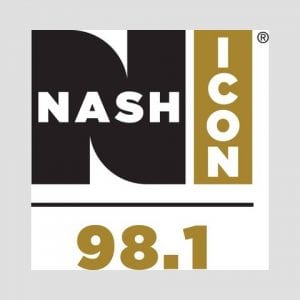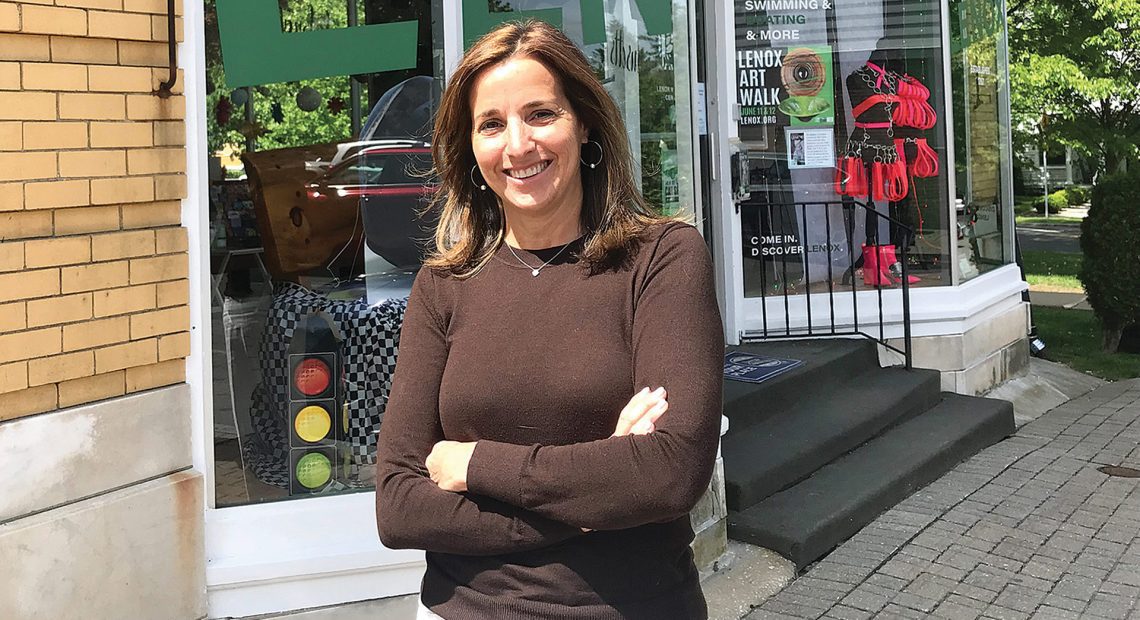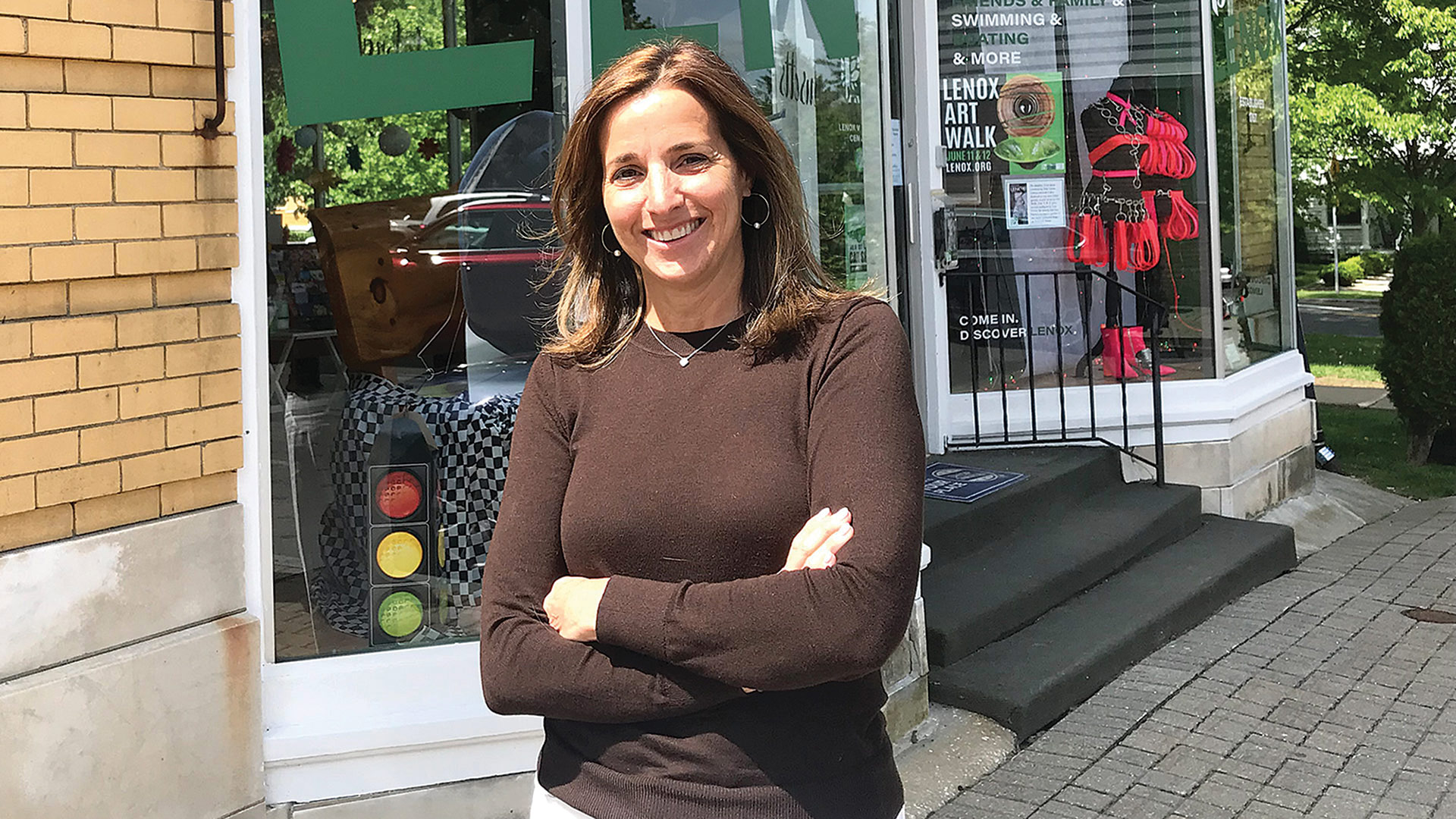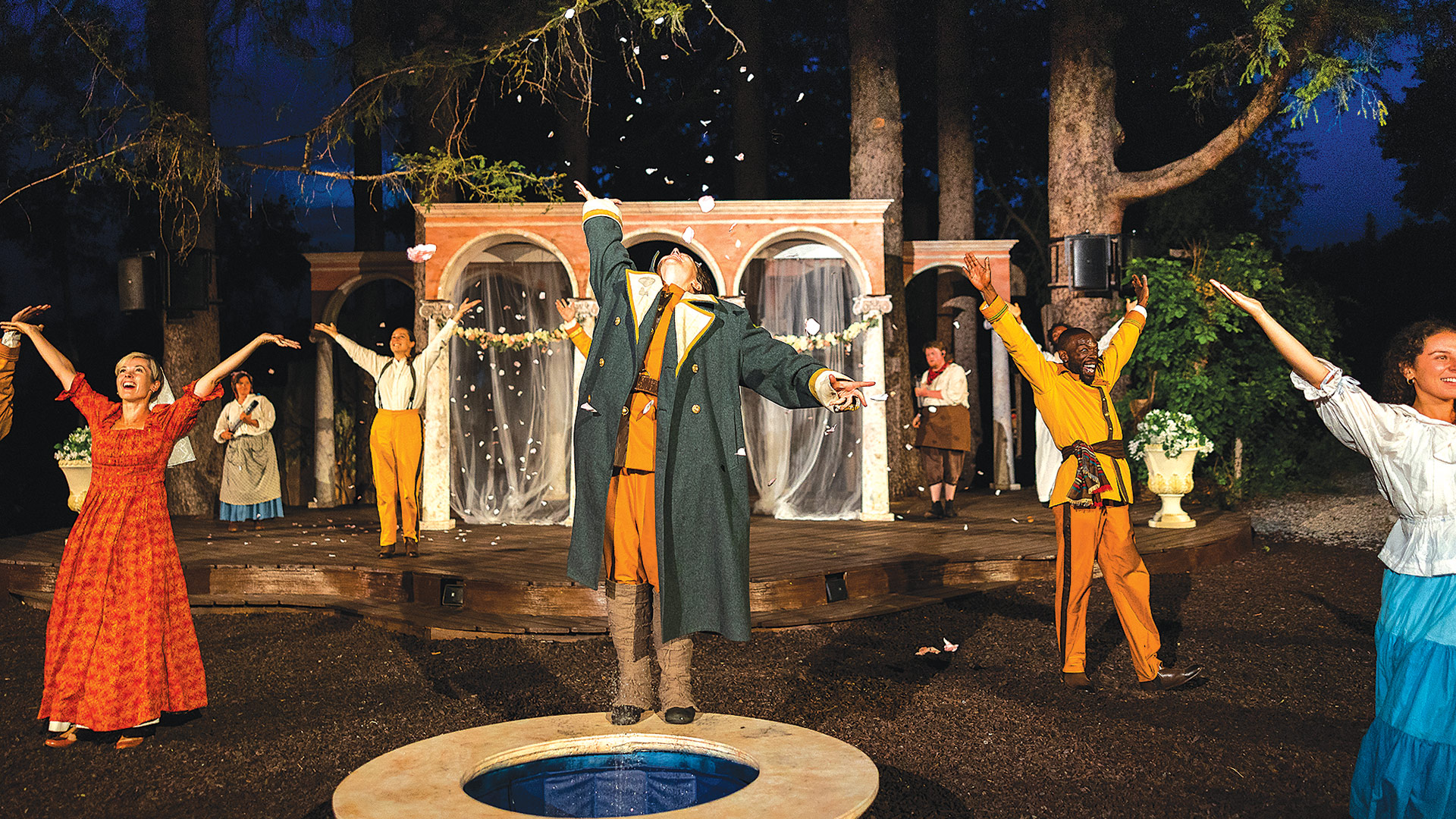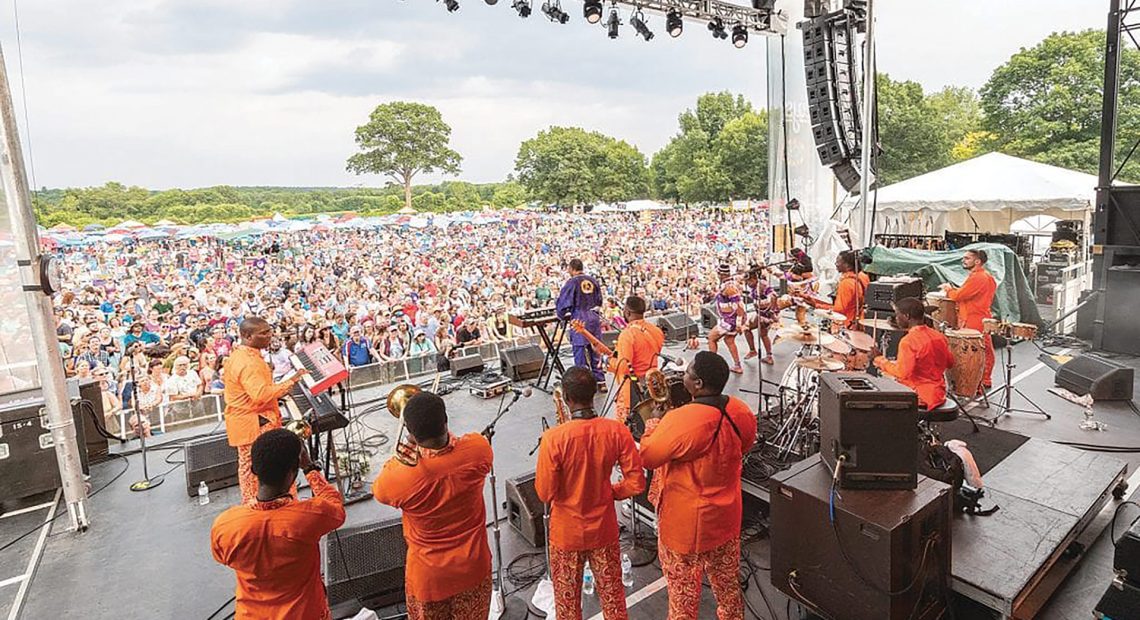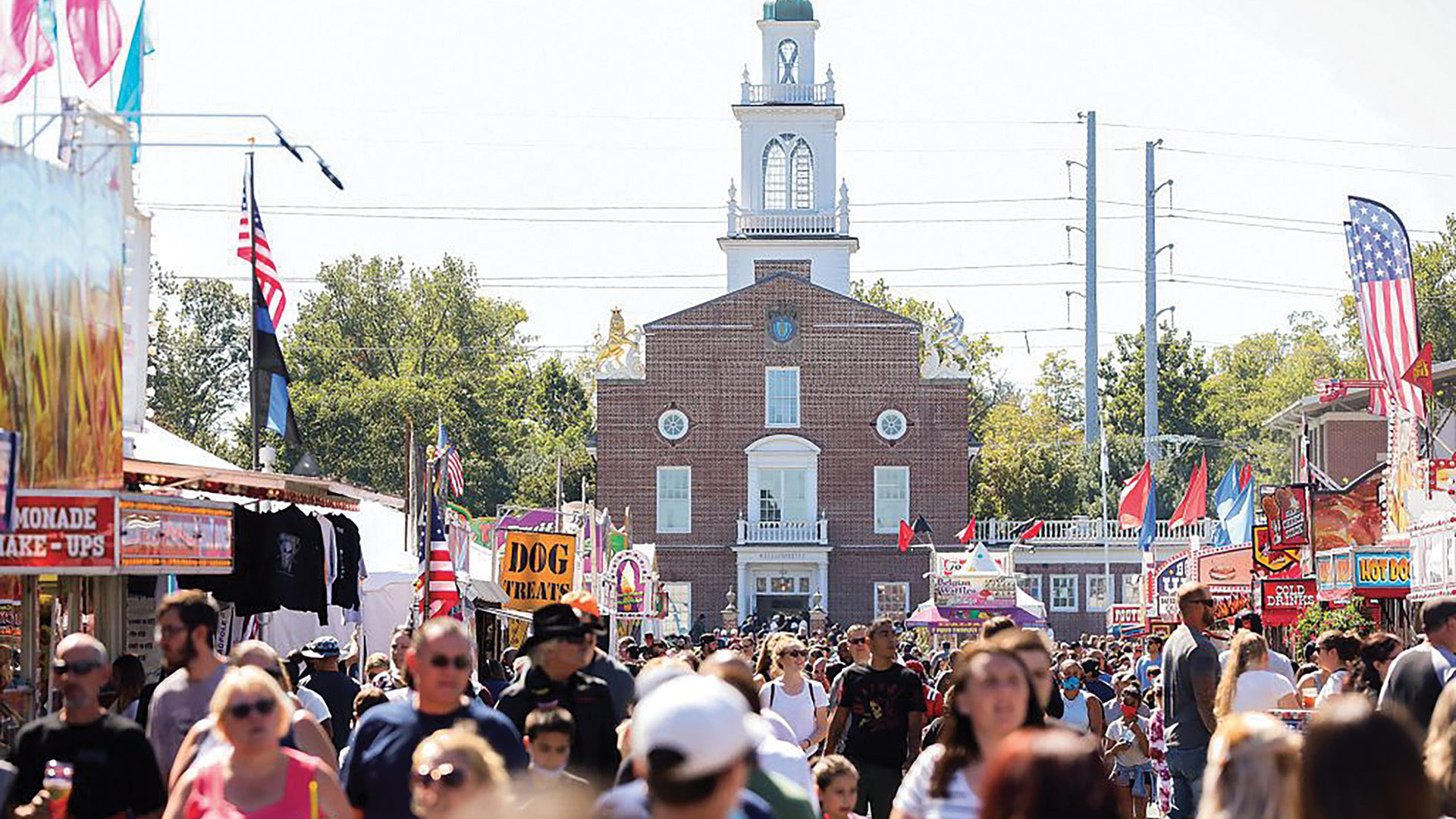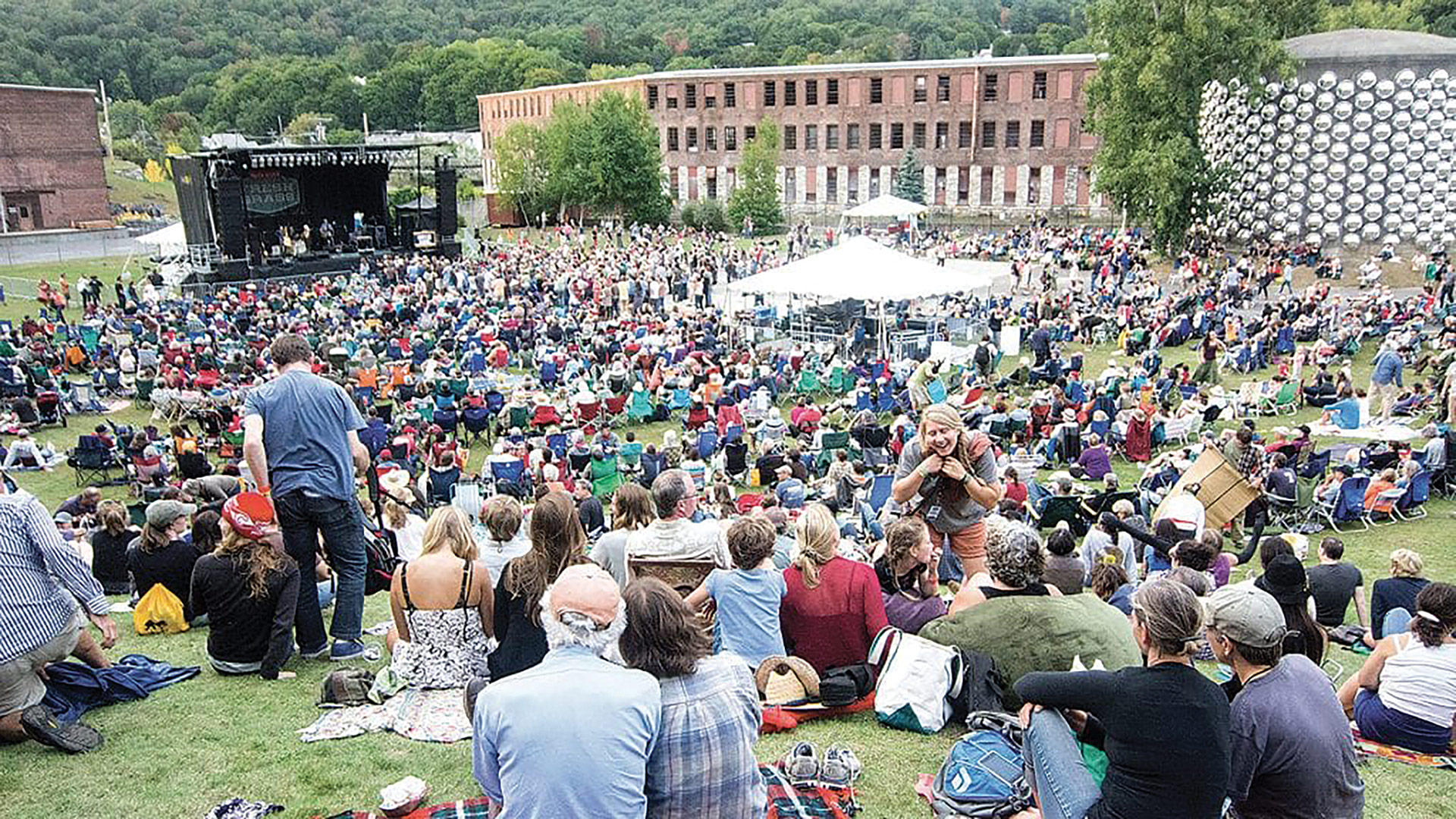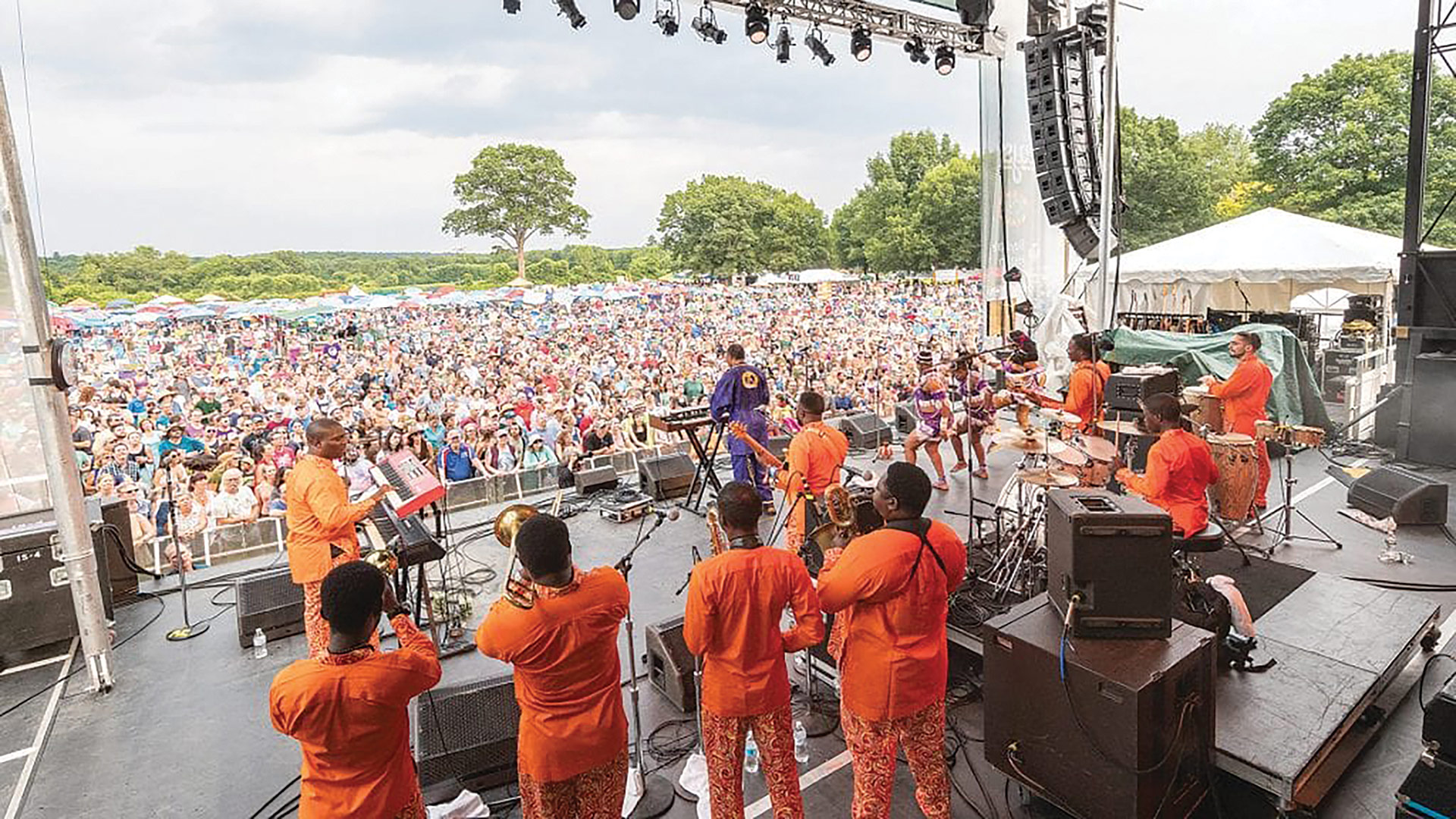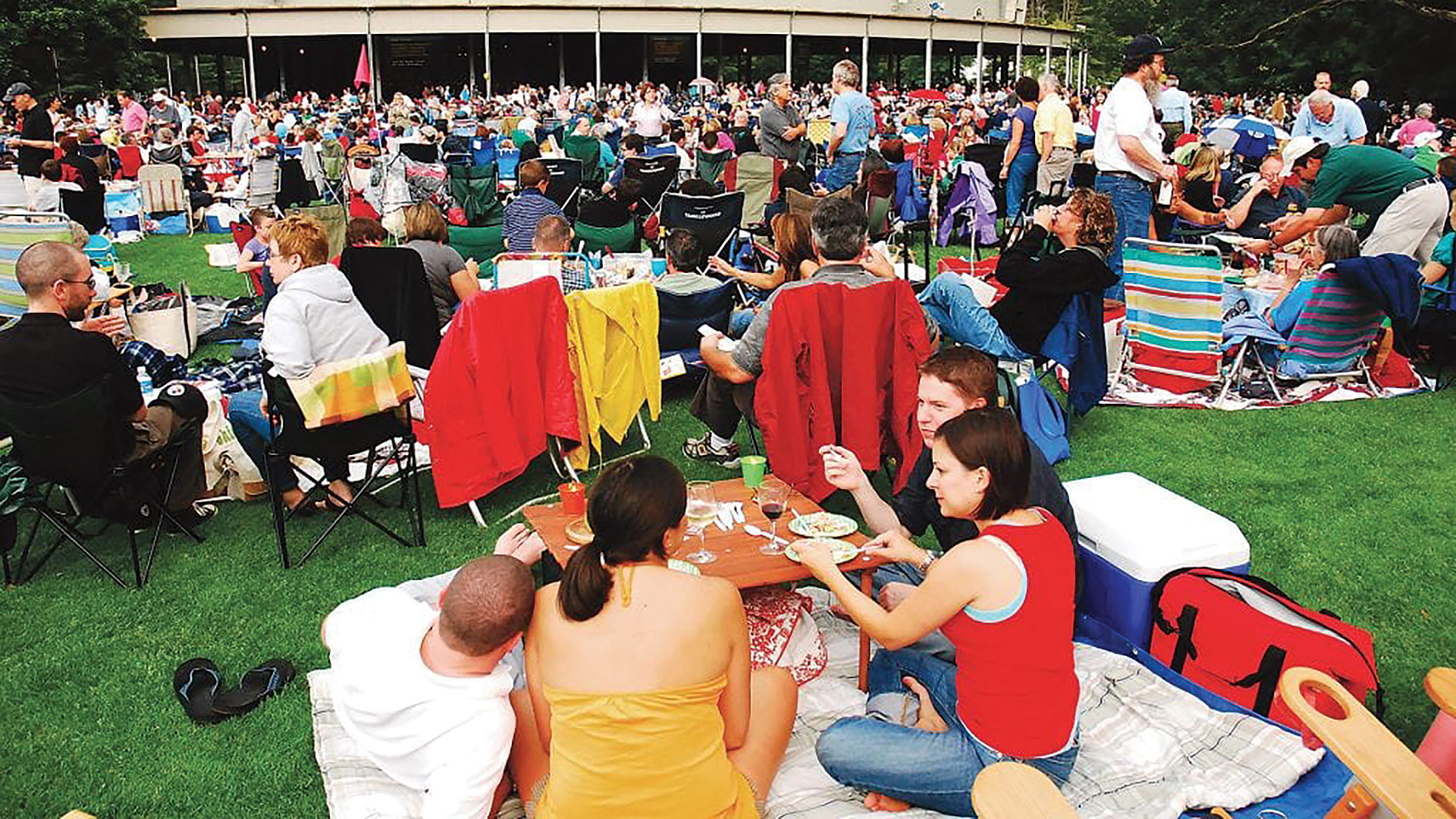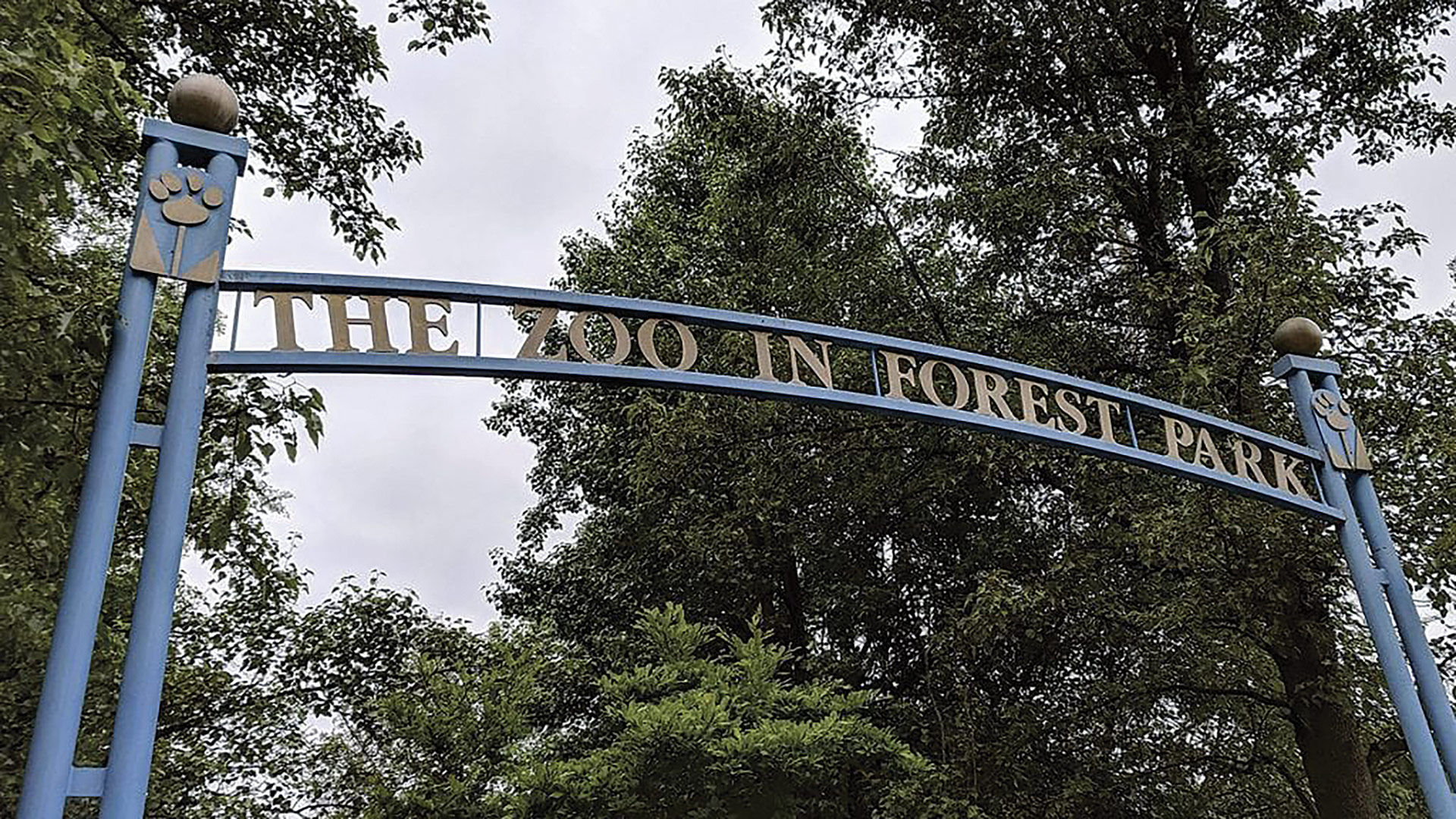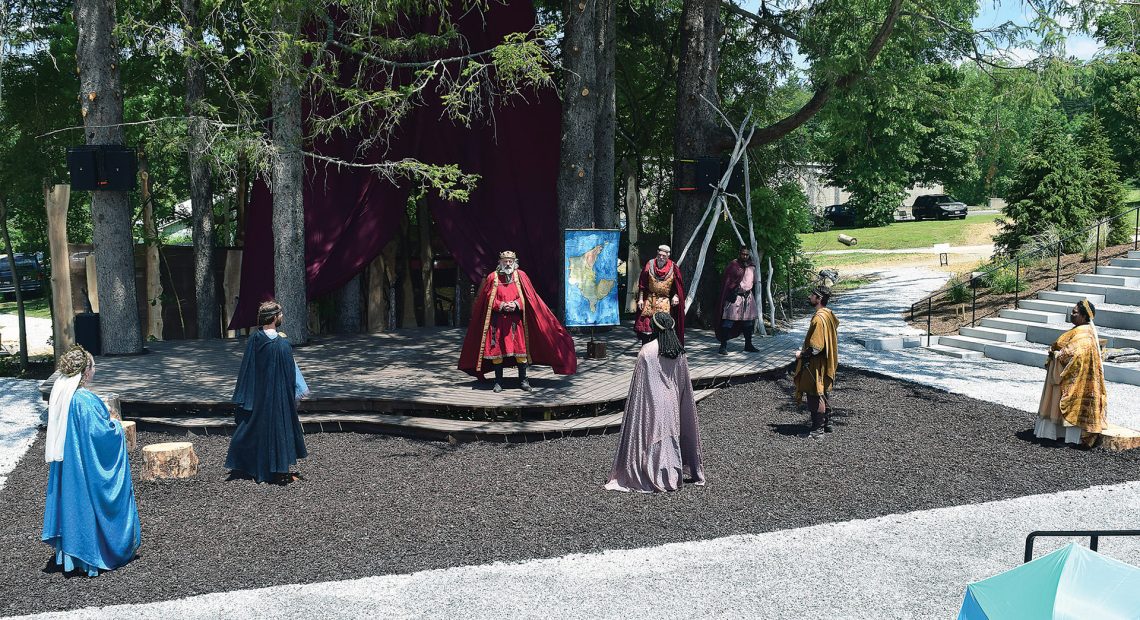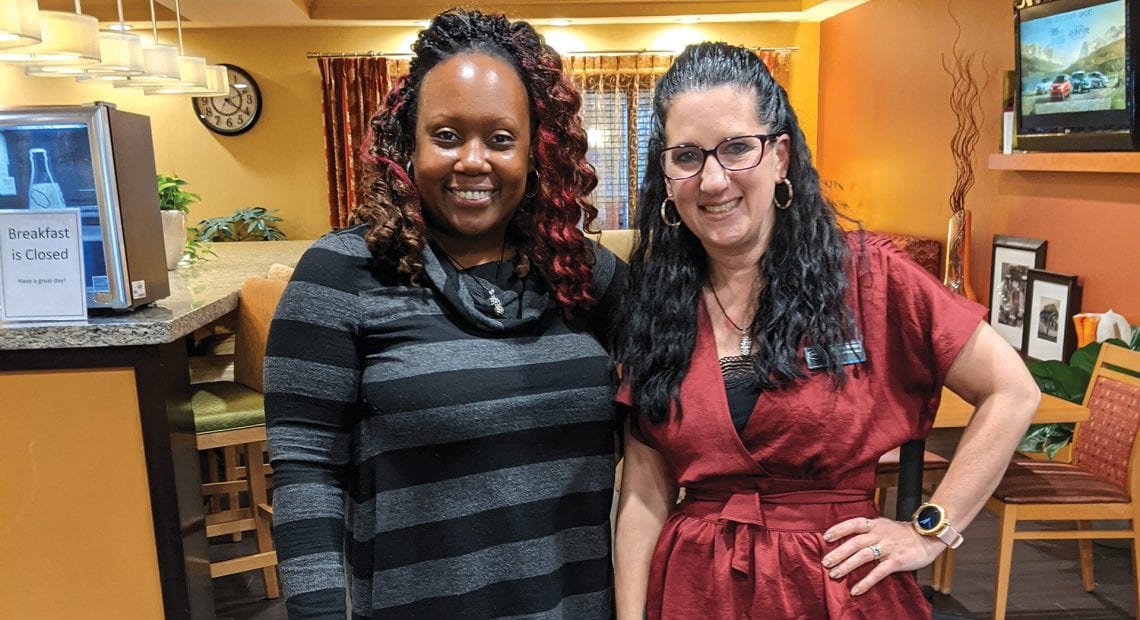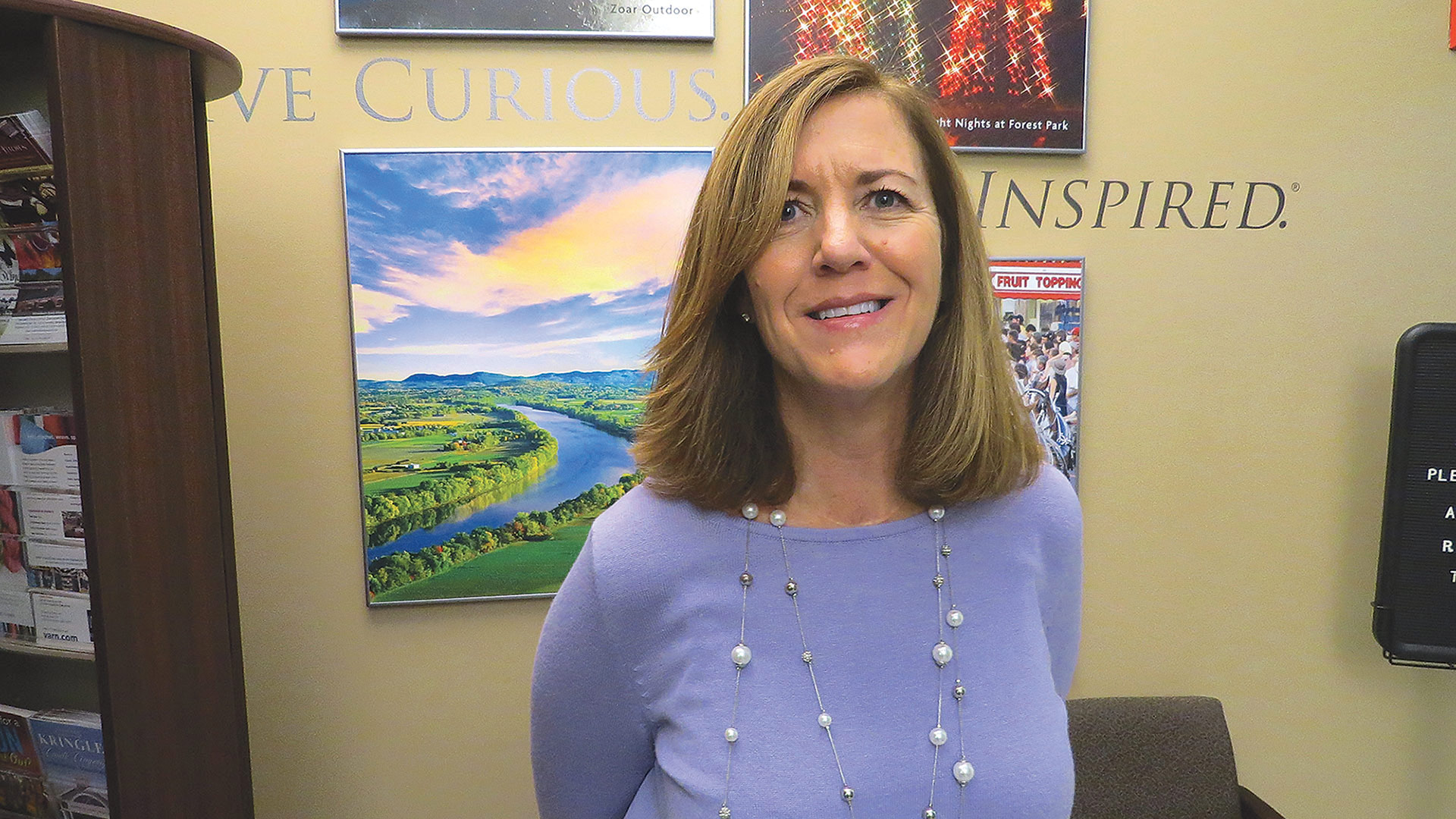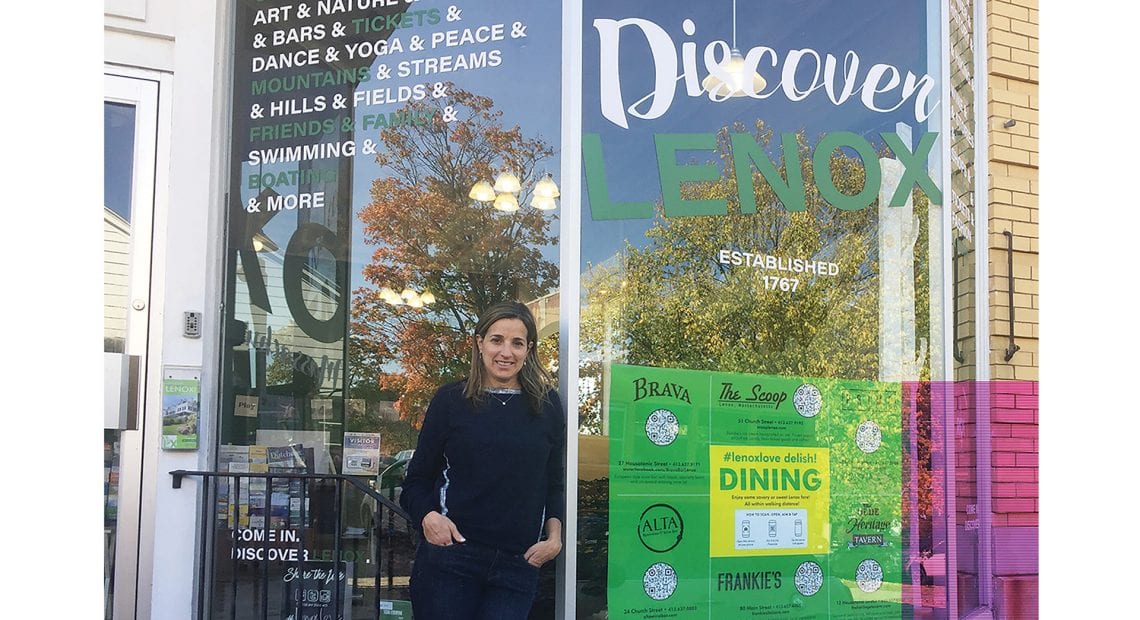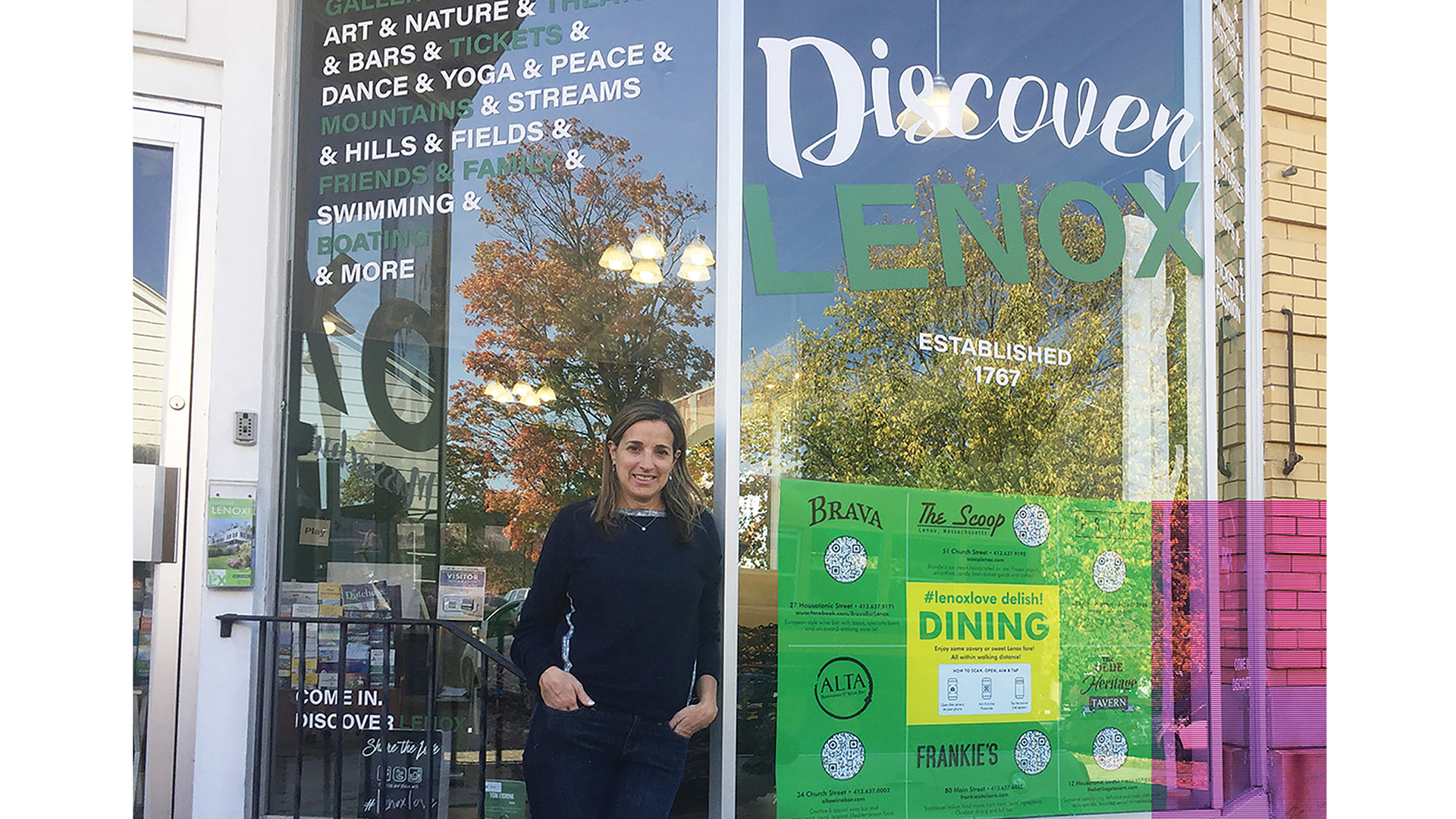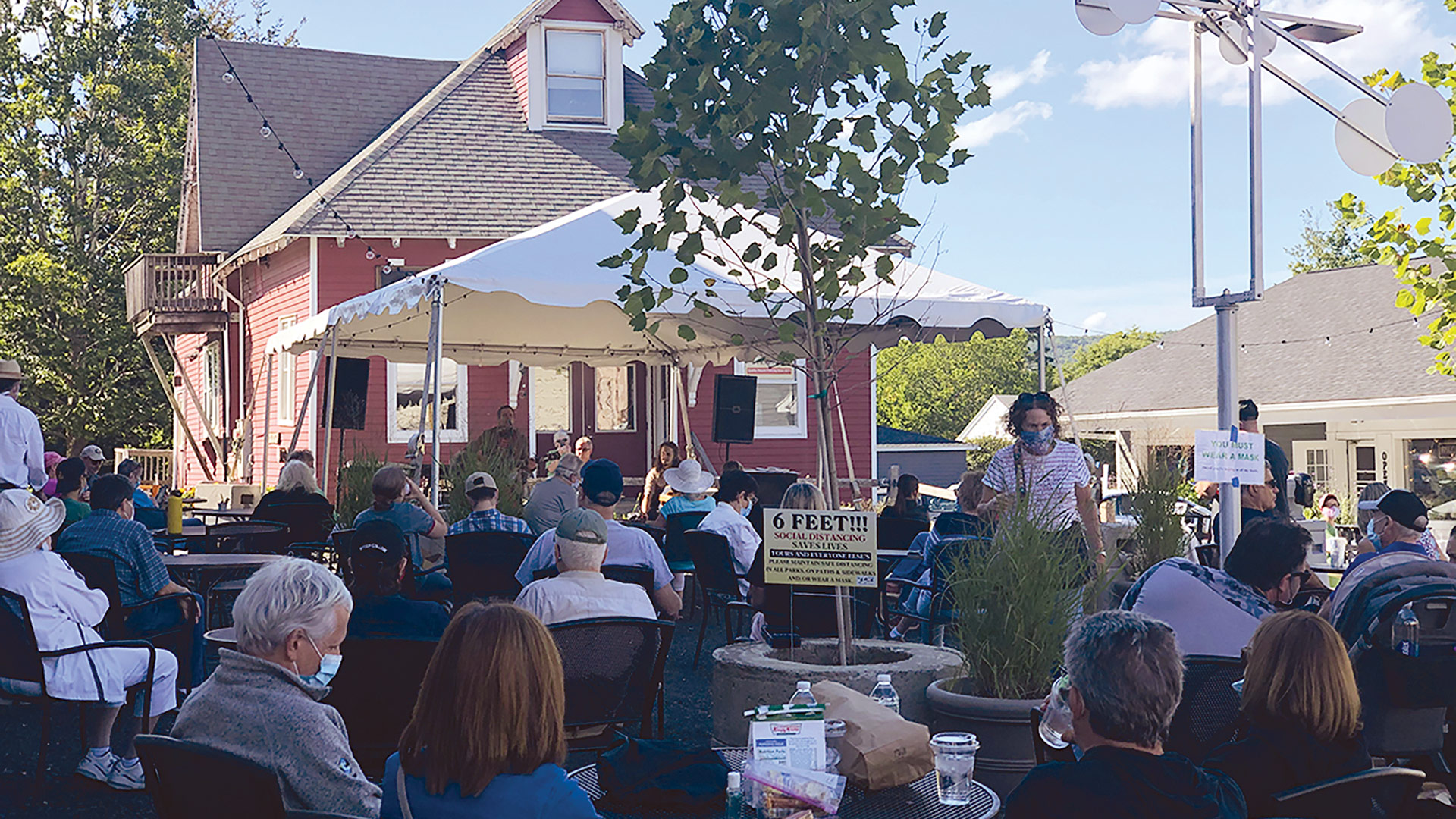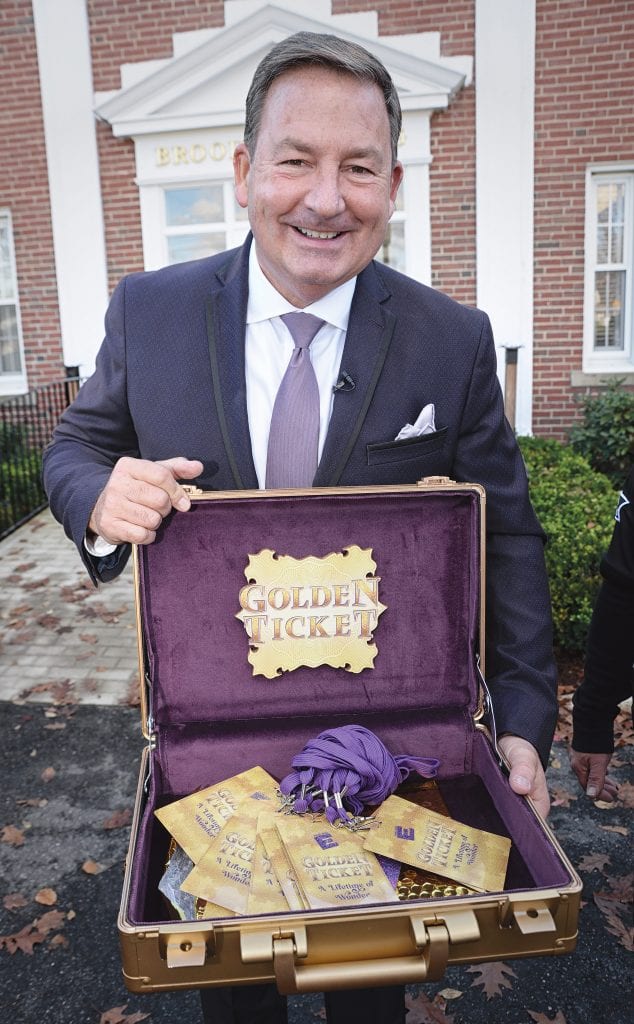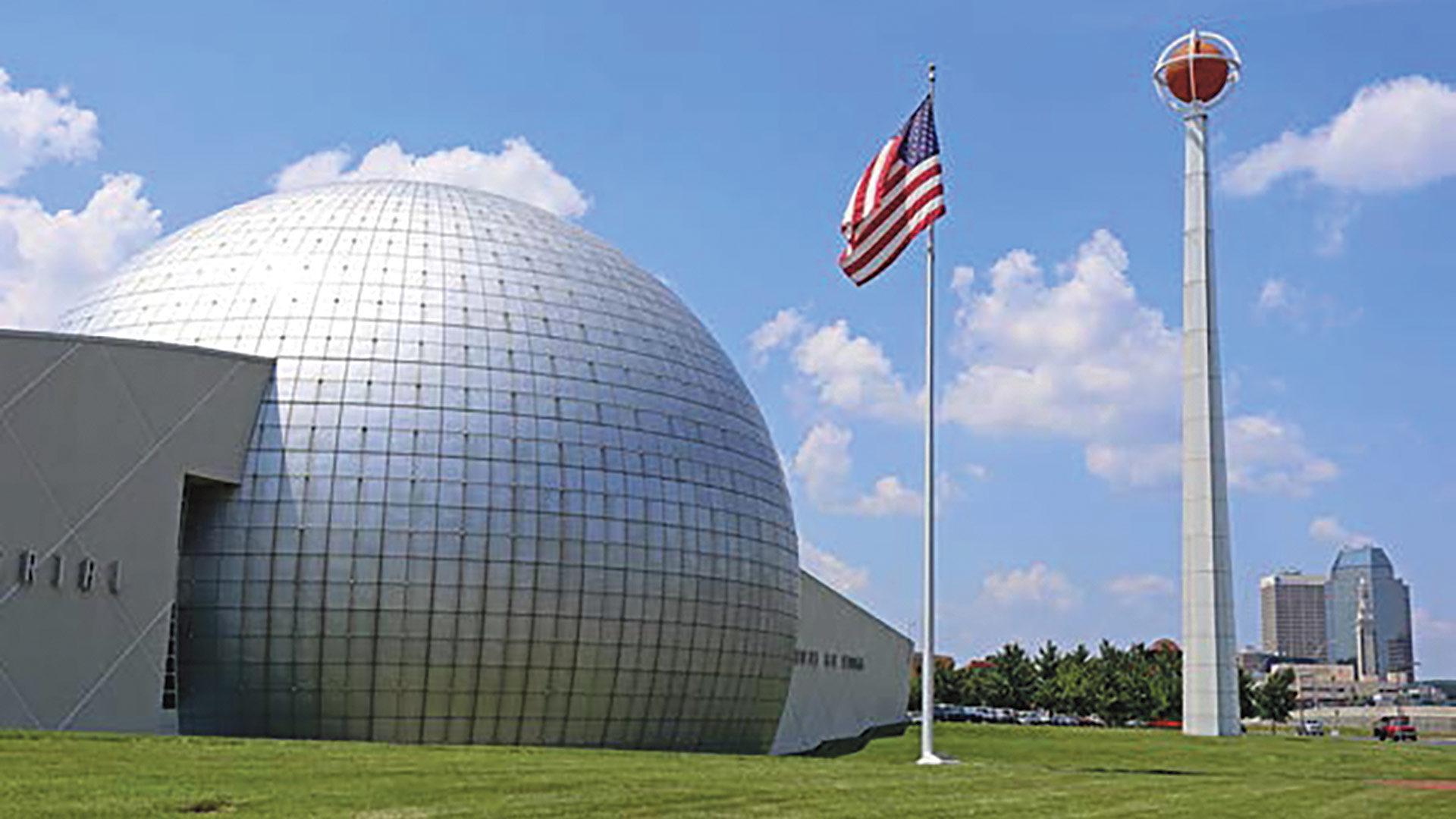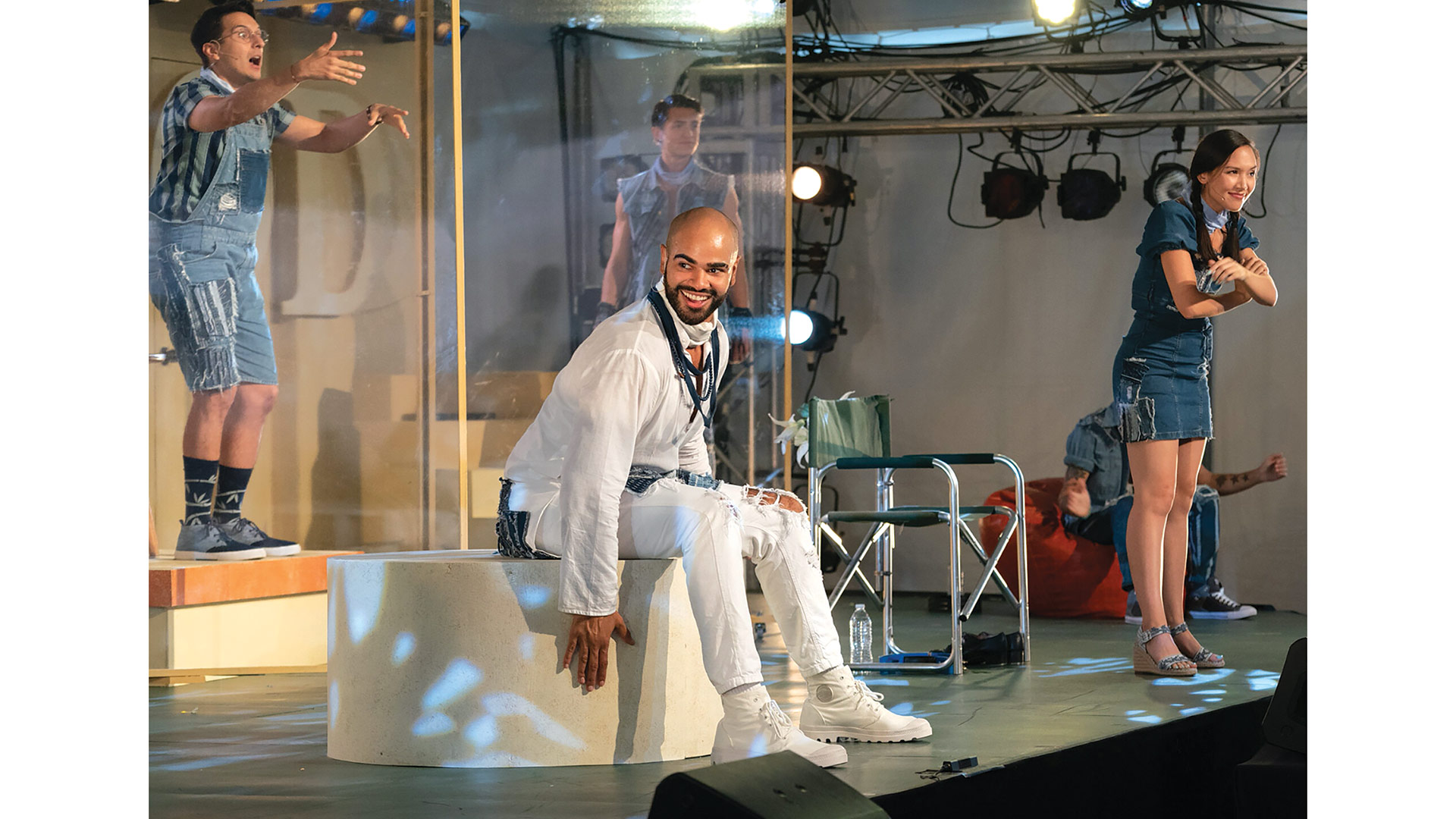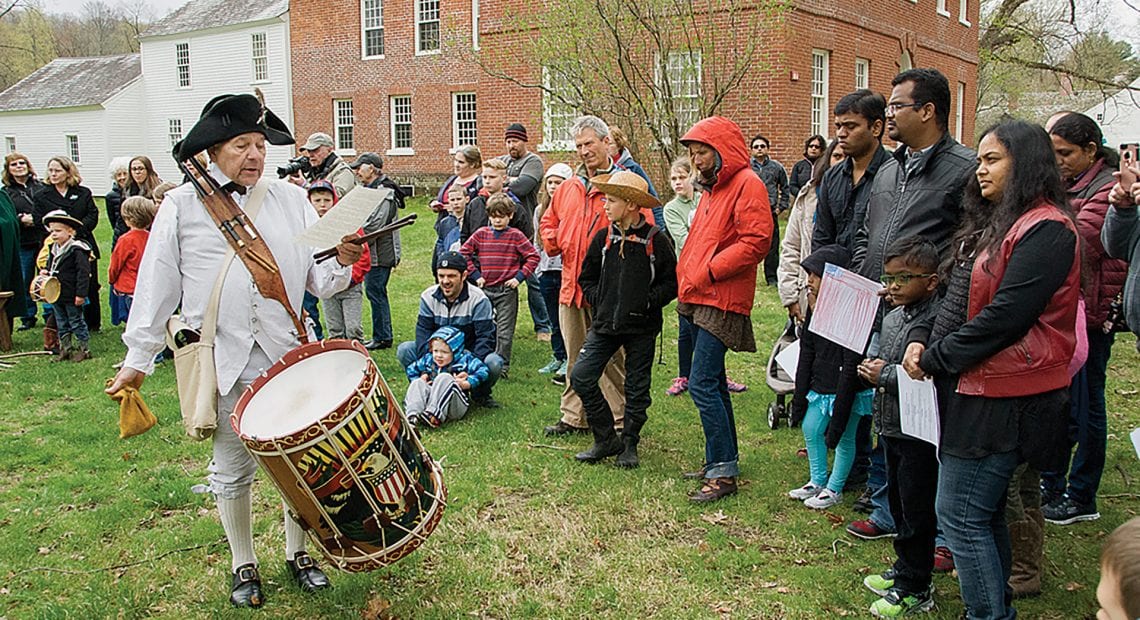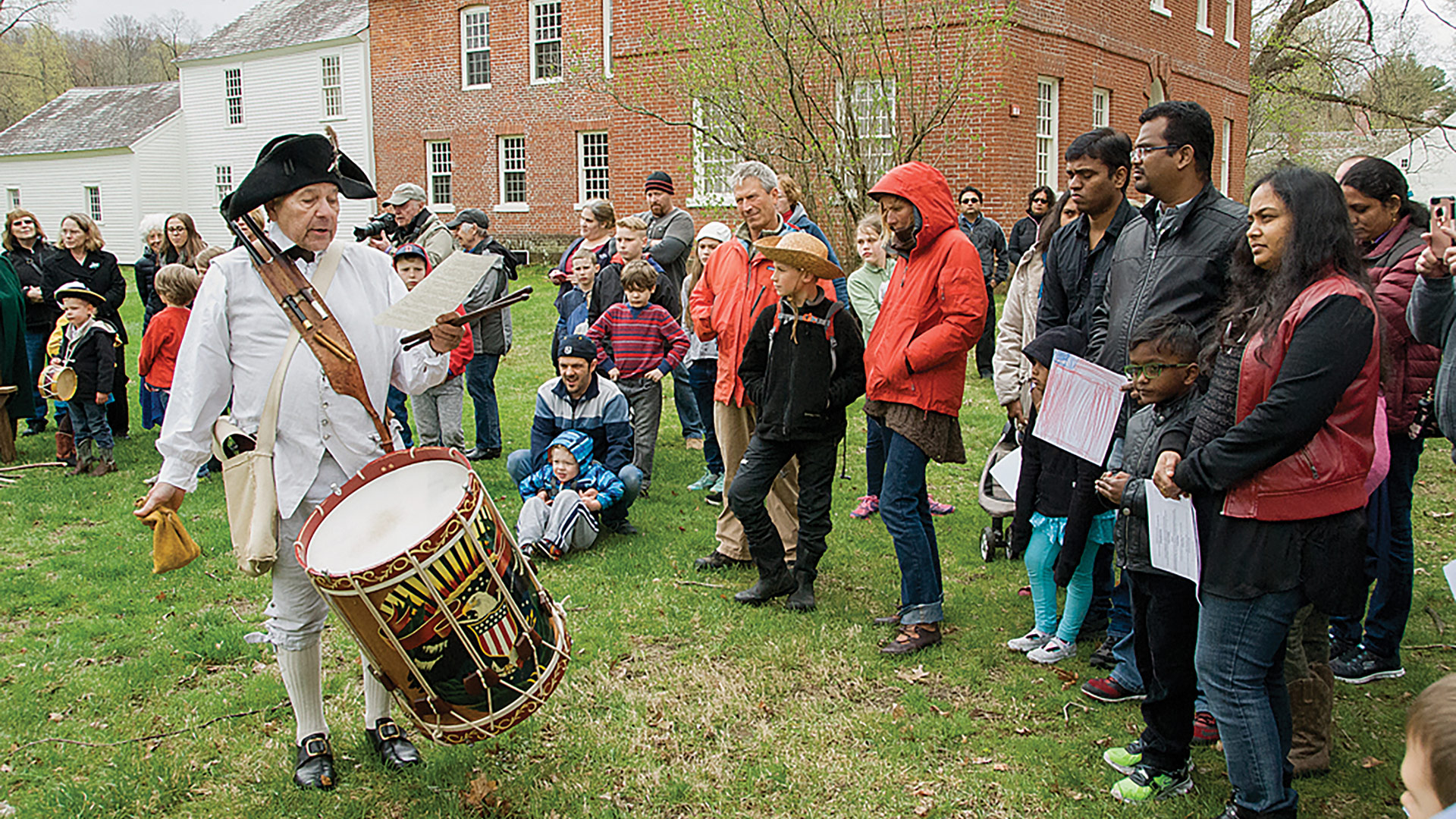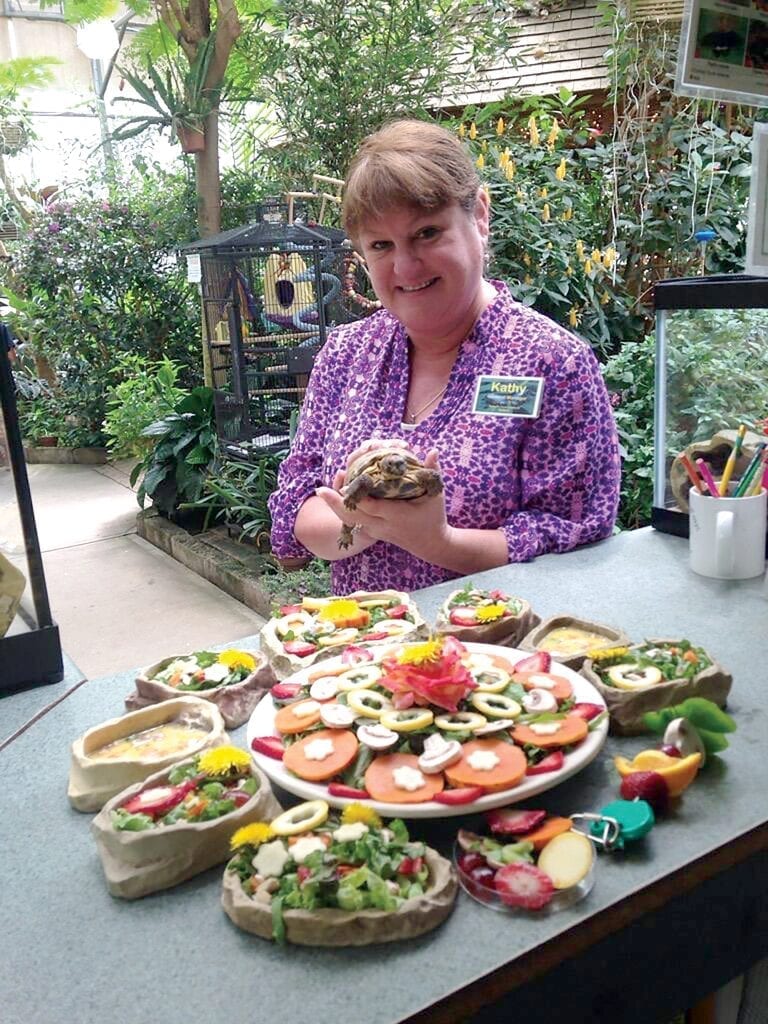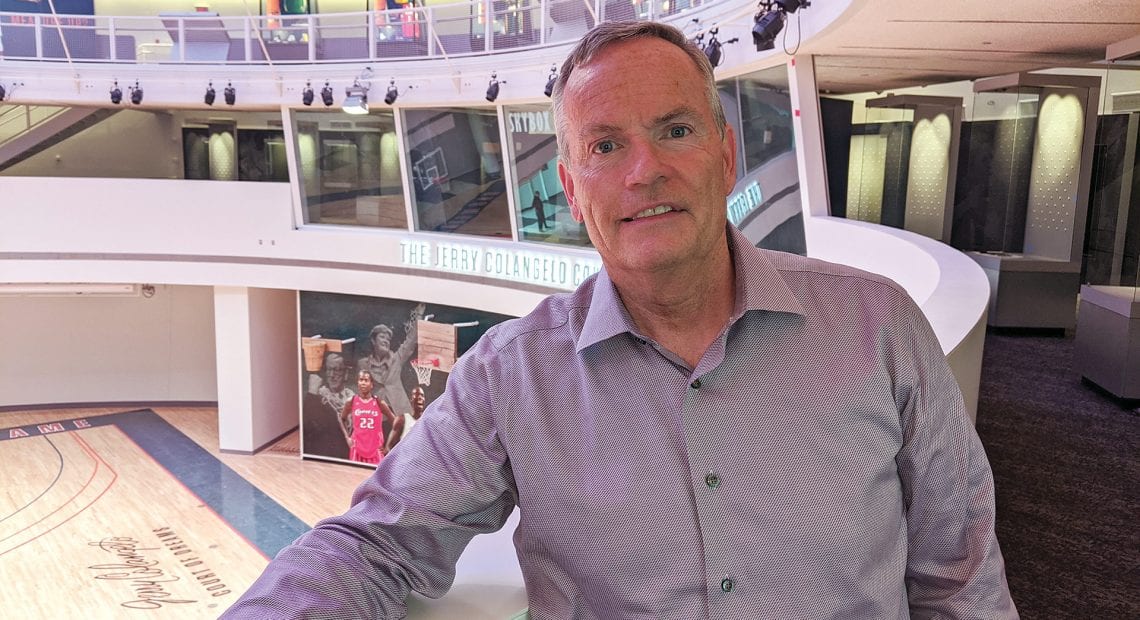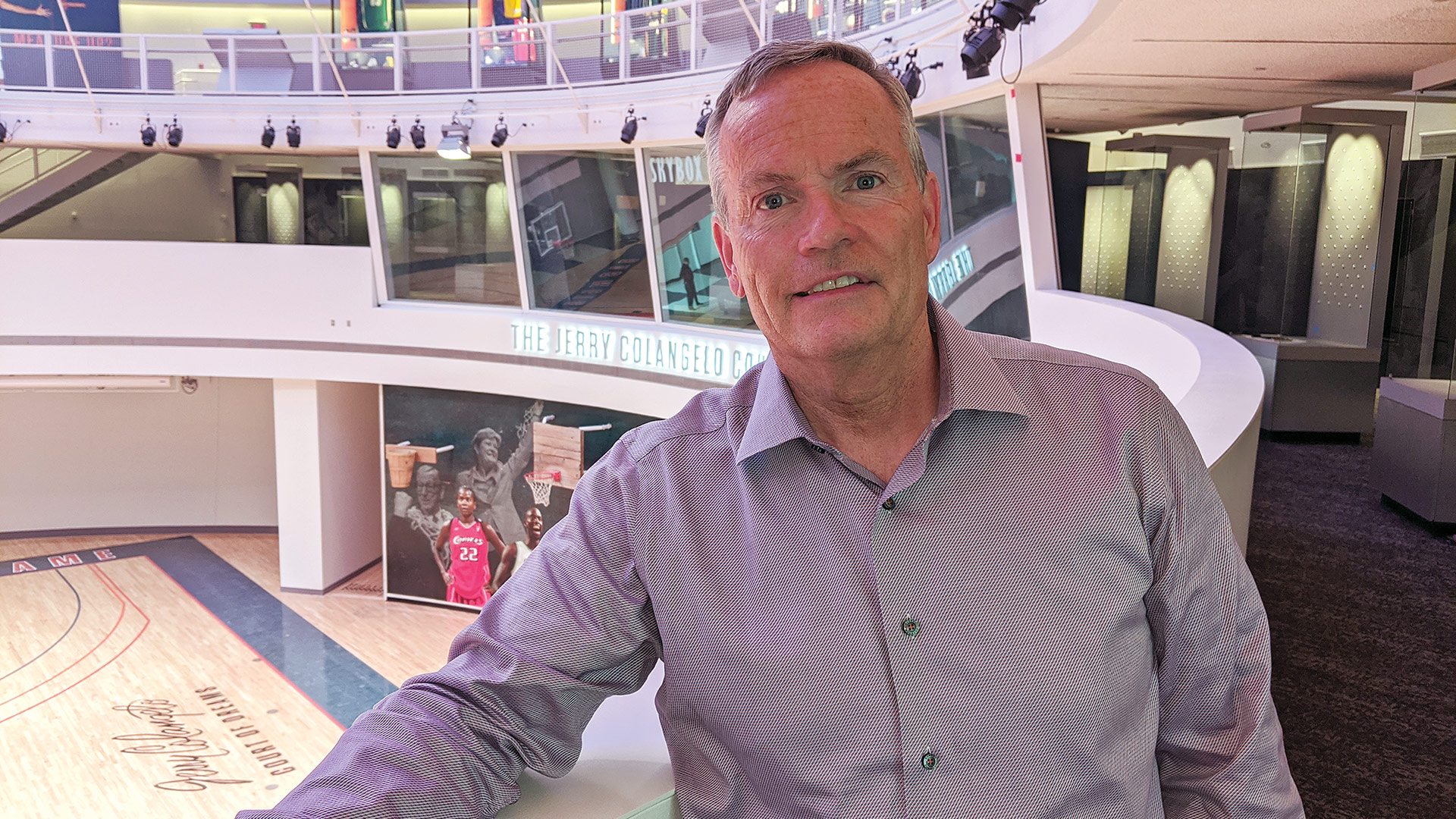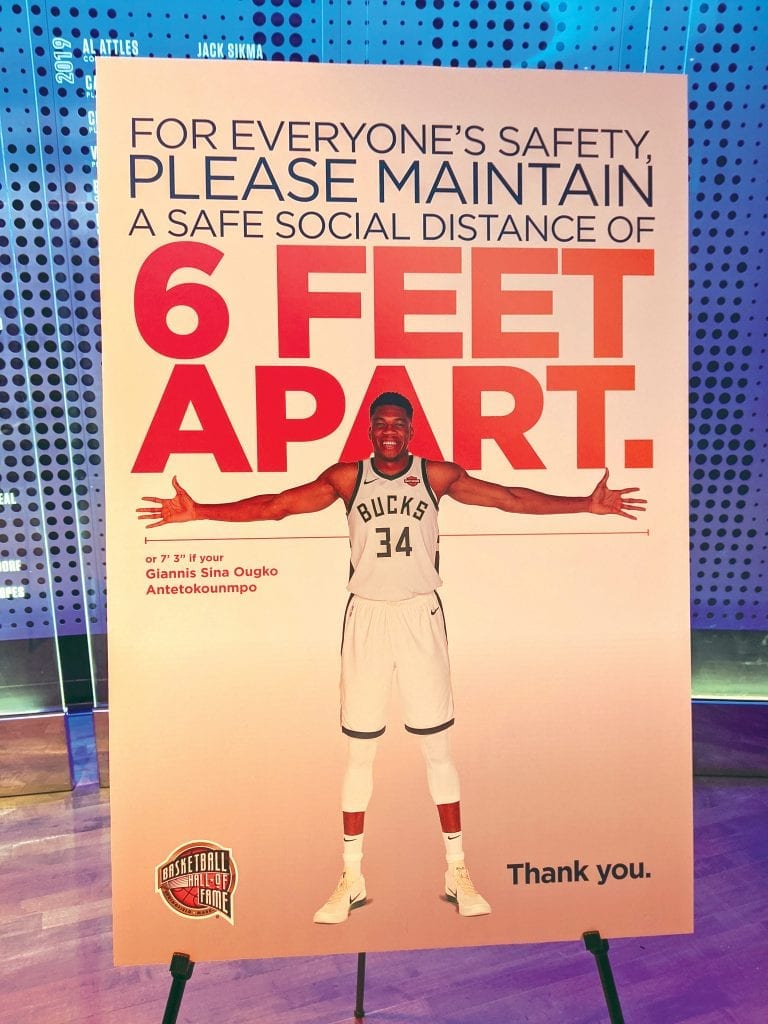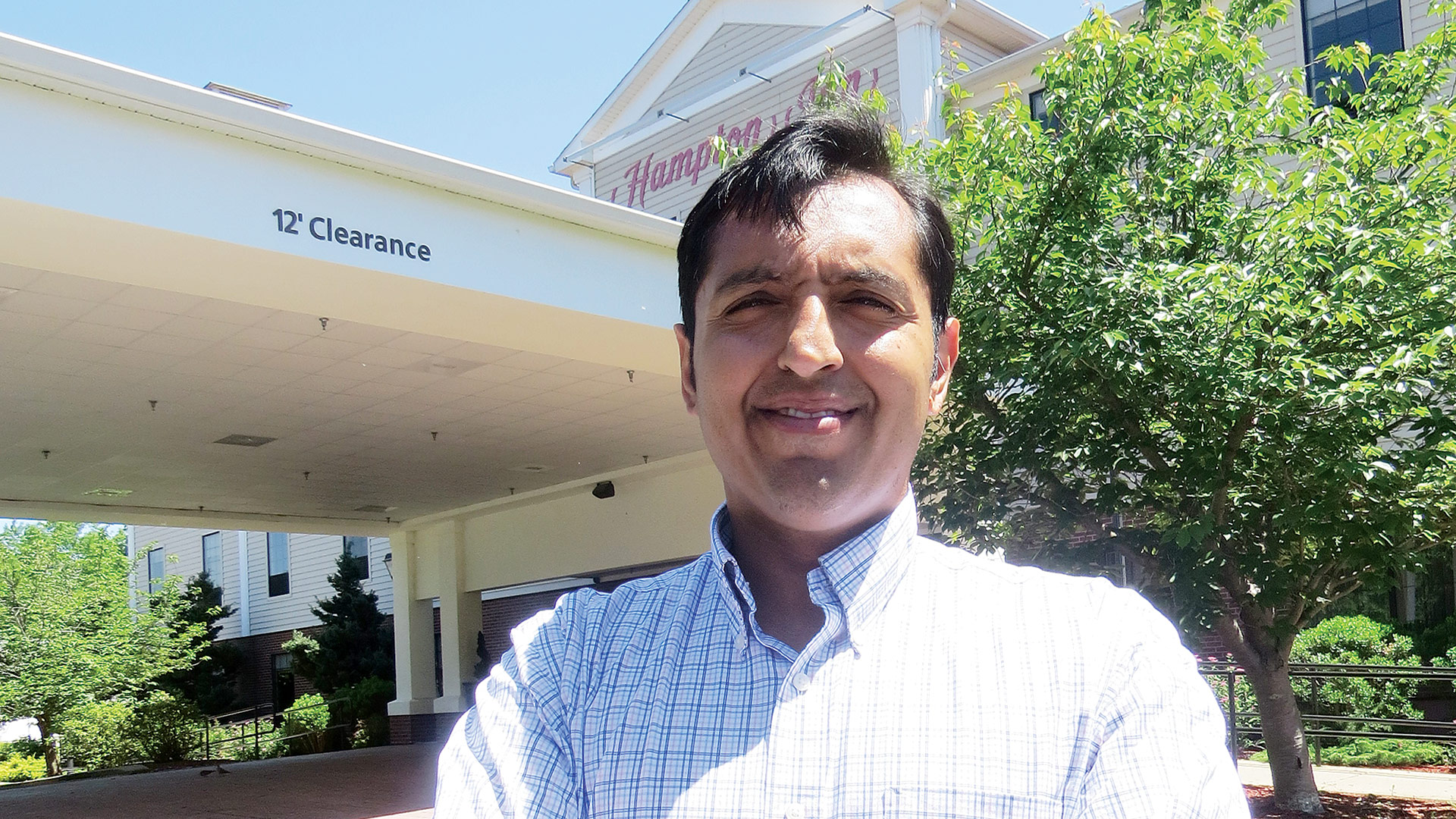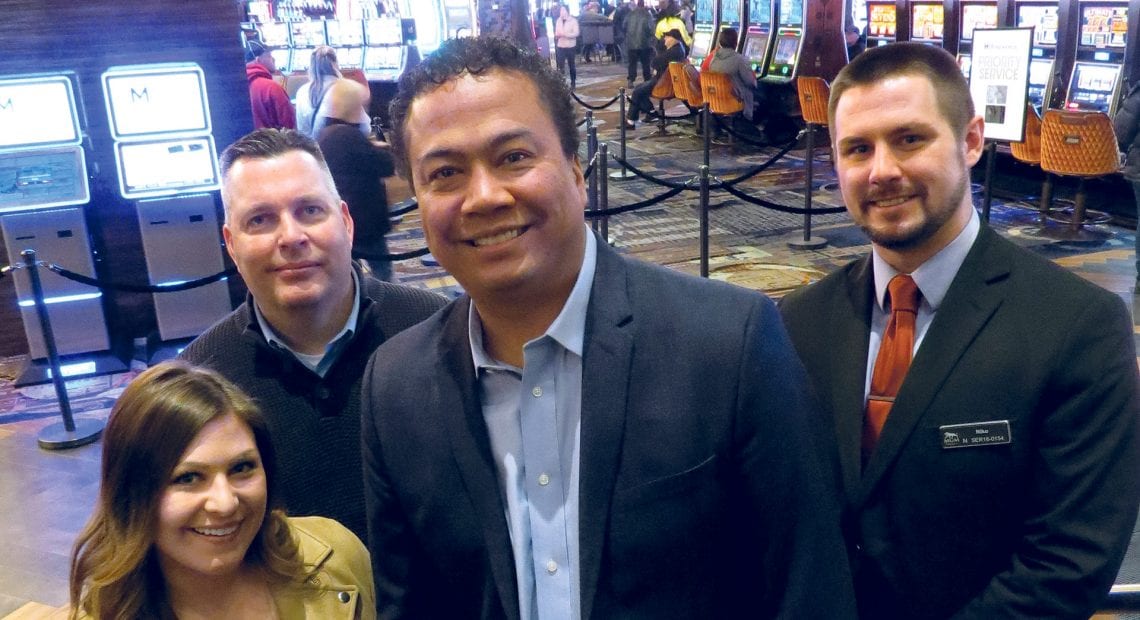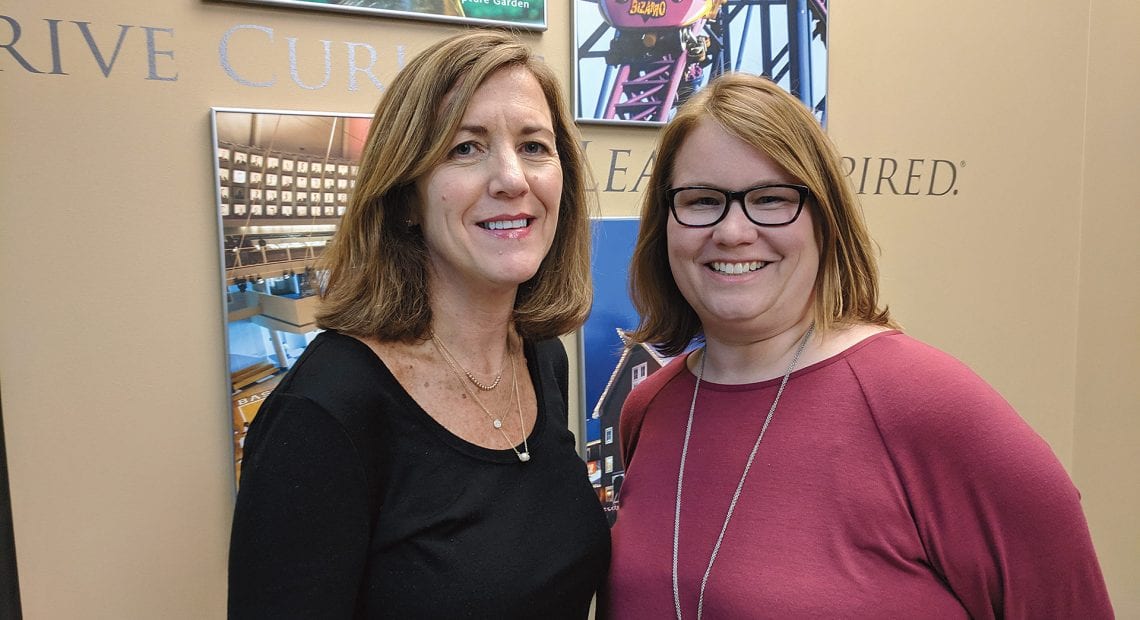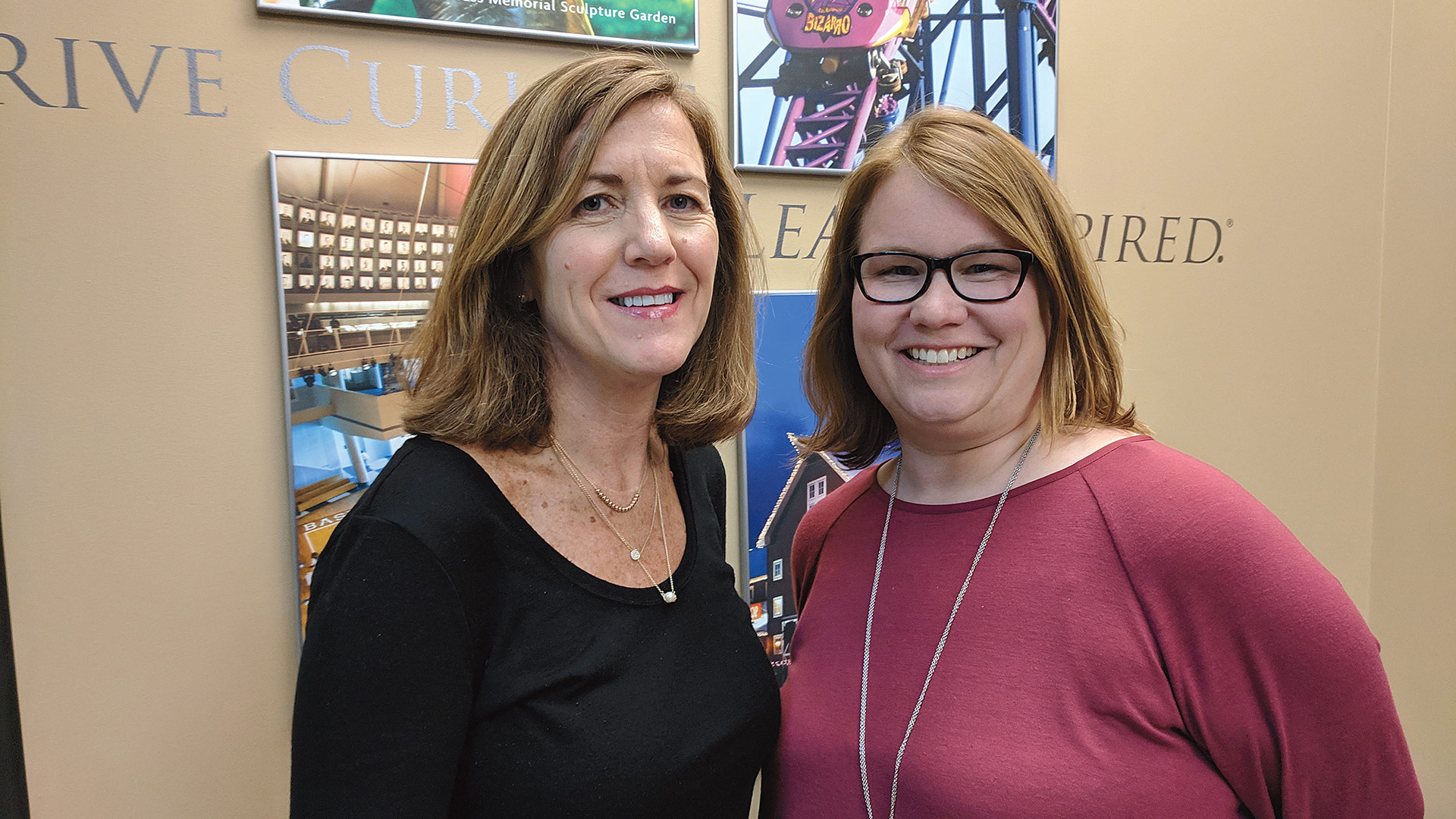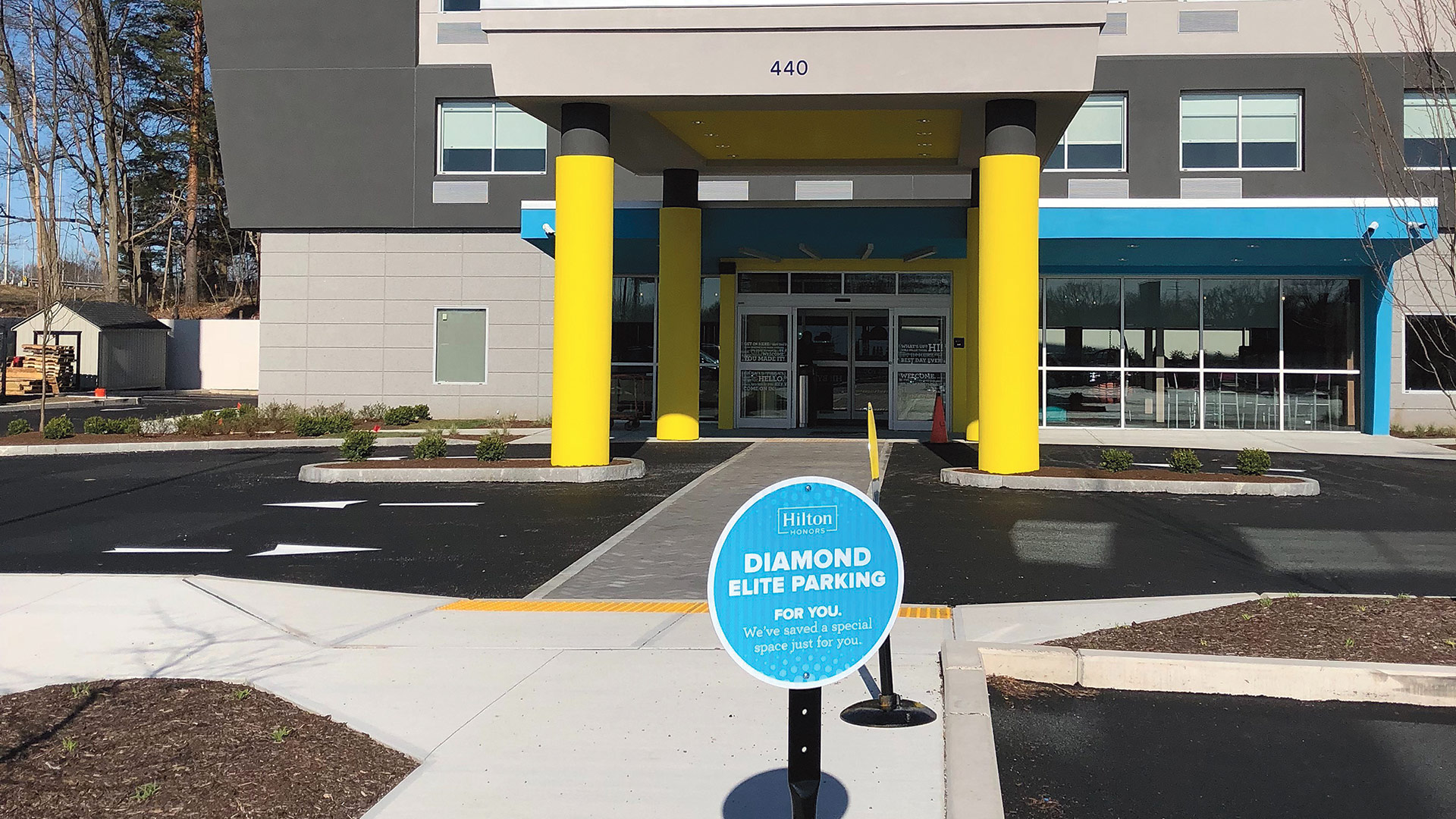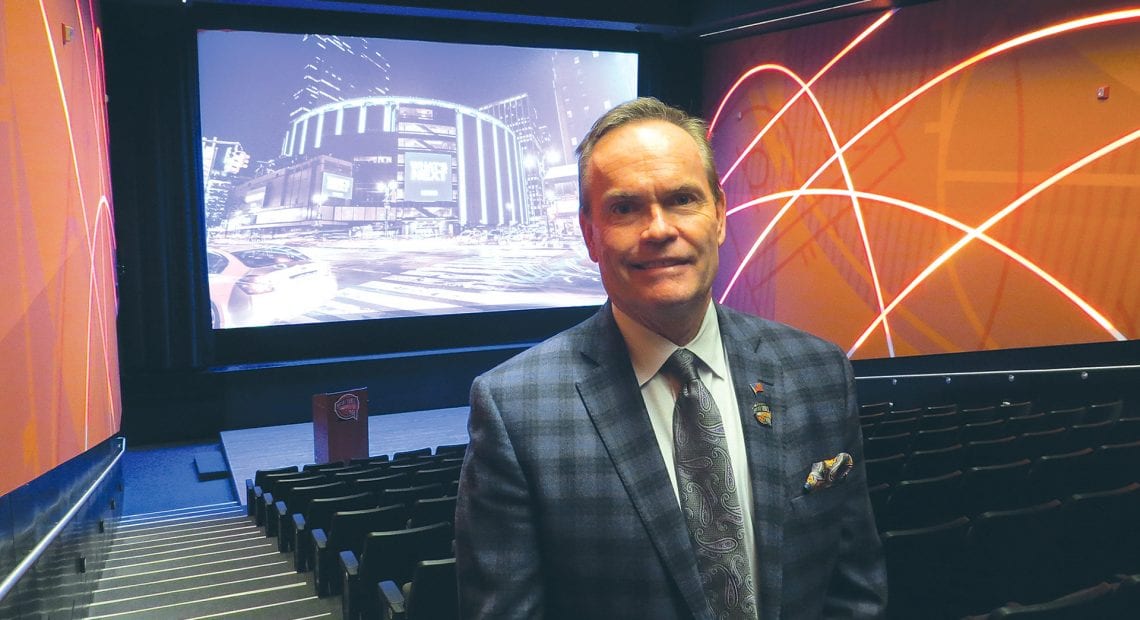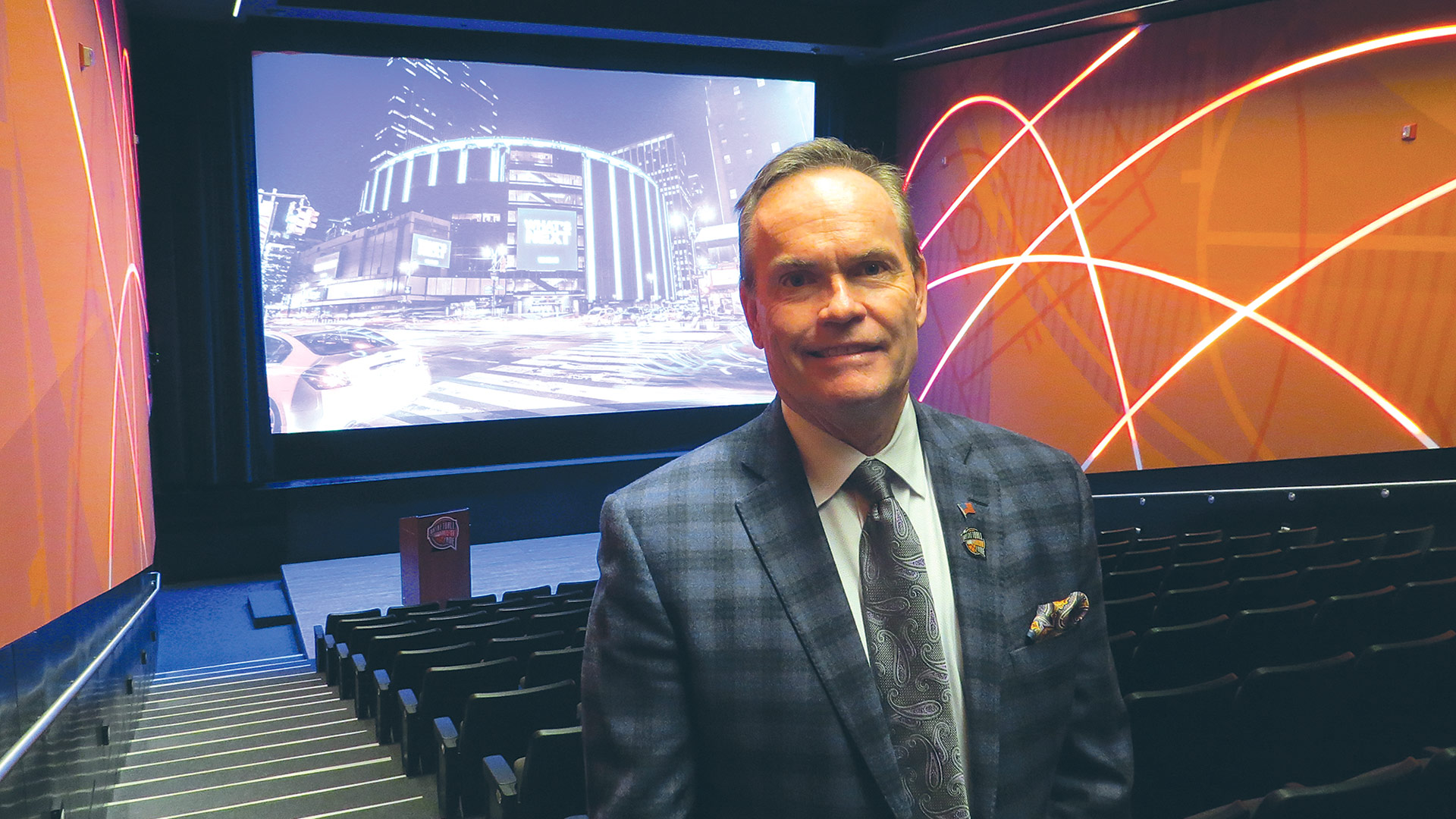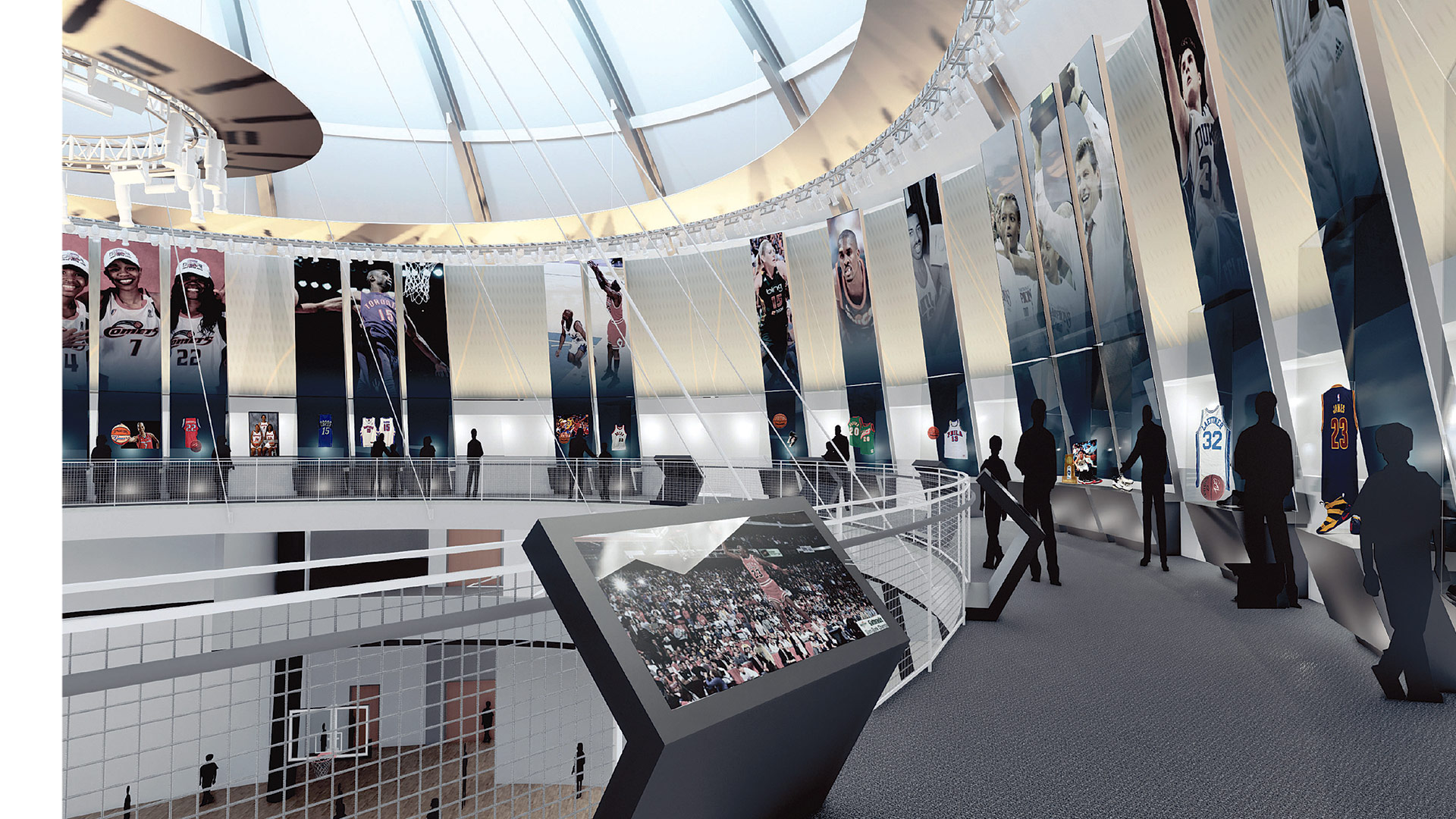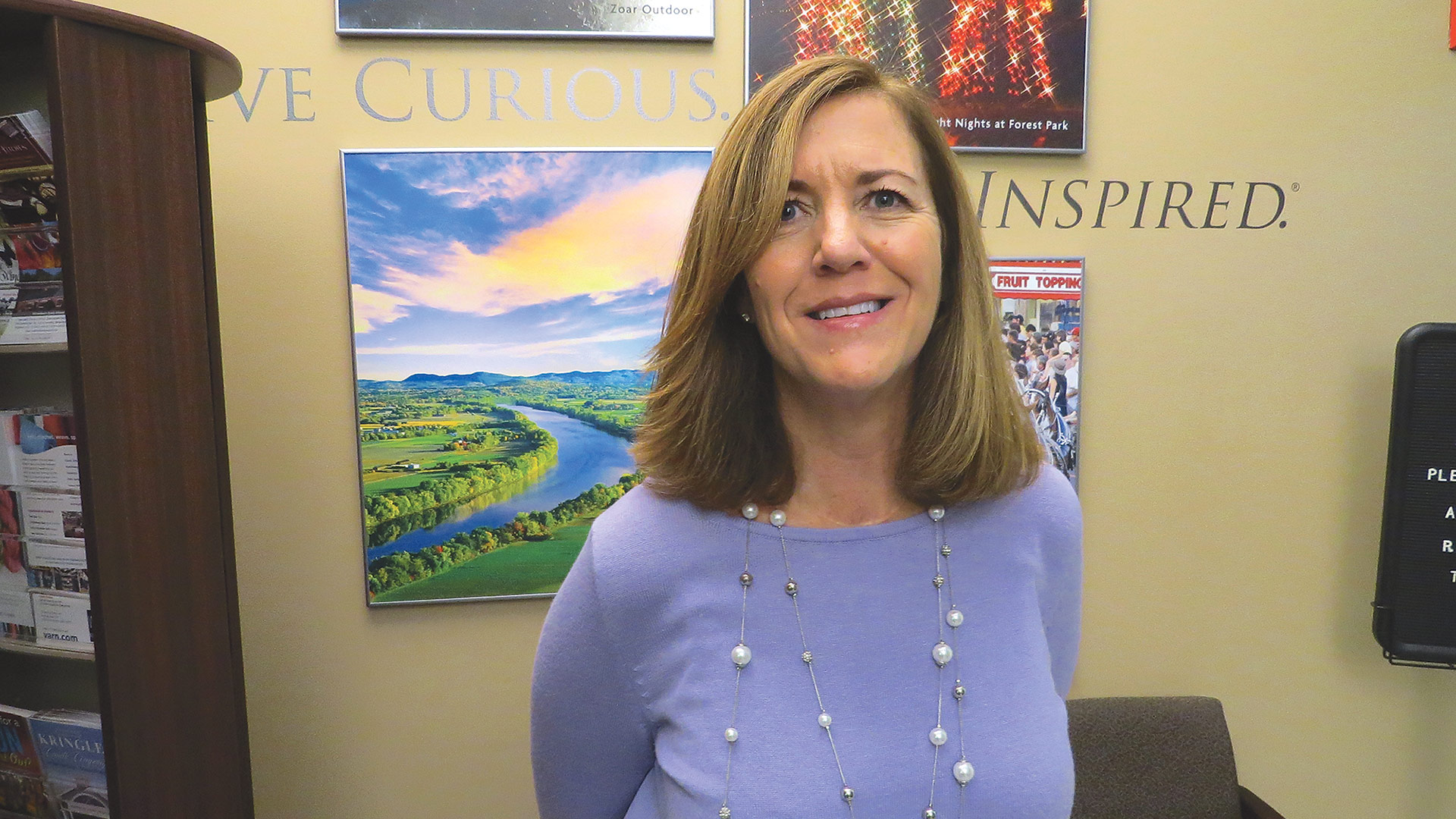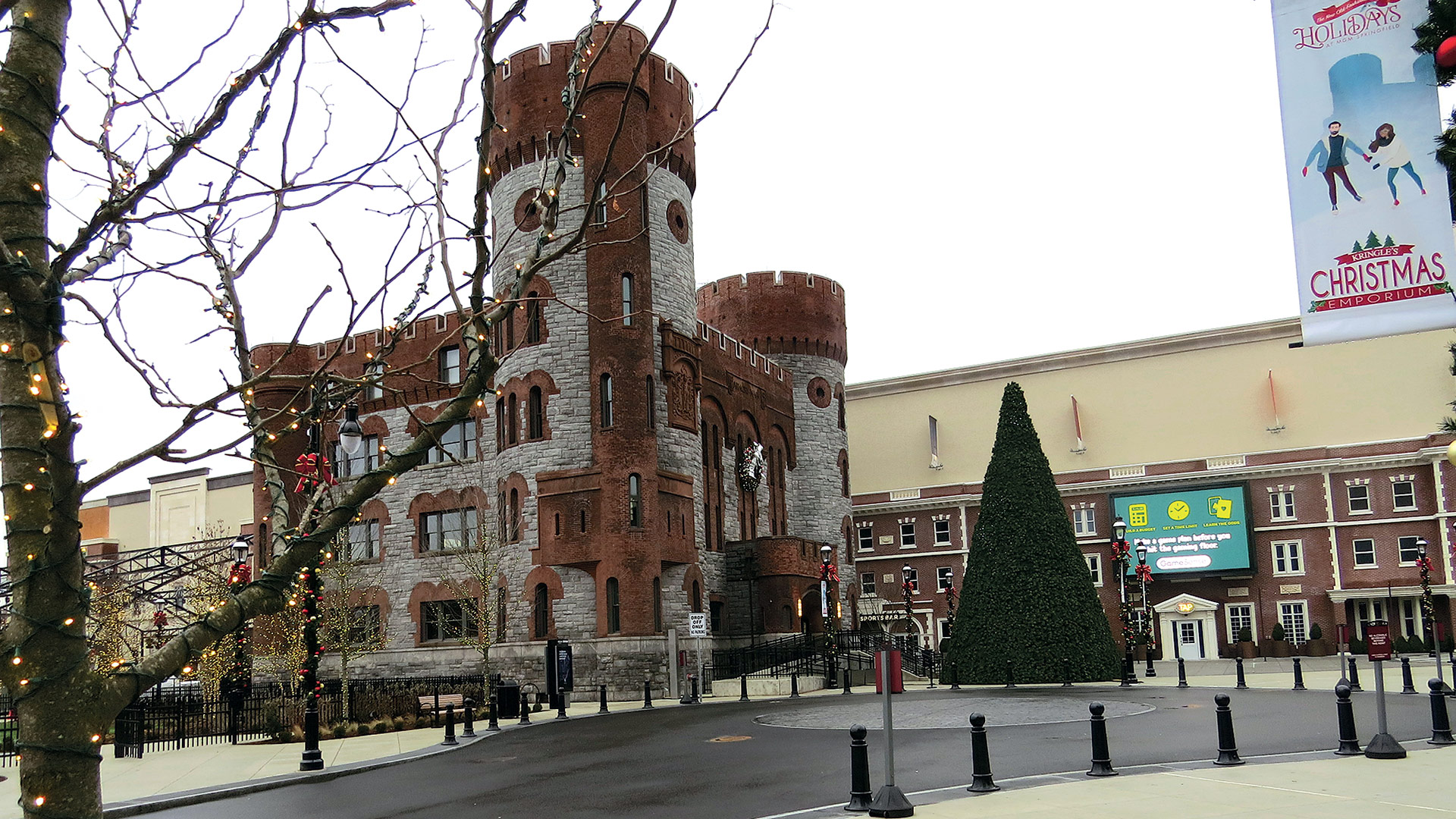A Six-month Checkup
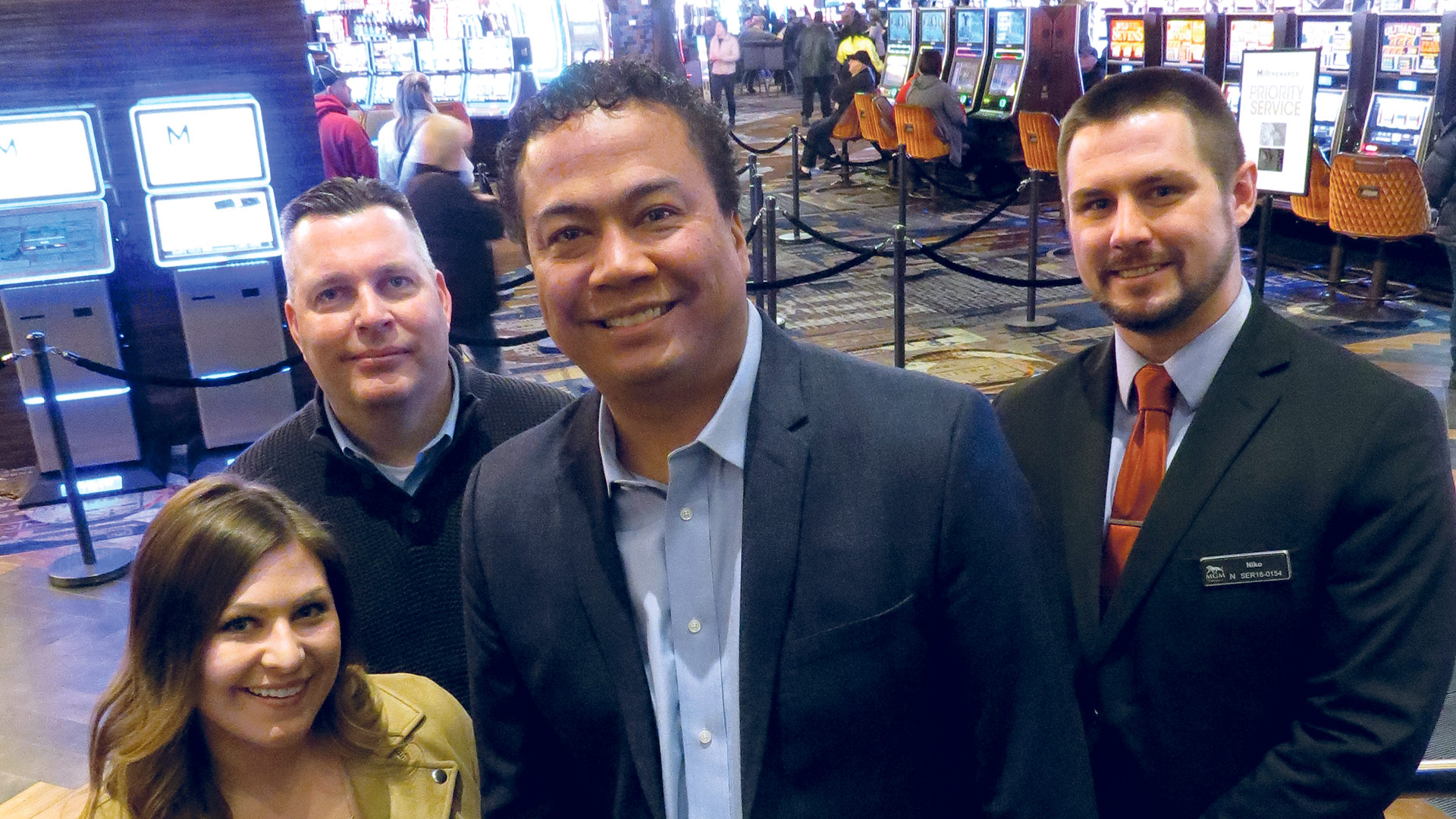
Mike Mathis, foreground, with recently promoted MGM employees, from left: Marissa Dombkowski, Bill Blake, and Nickolaos Panteleakis.
A half-year after opening its doors, MGM Springfield is well behind its stated goals and expectations for gross gaming revenues, or GGR, and the numbers have been declining each month since the fall. But the winter months are traditionally the slowest in this industry, said Mike Mathis, president and COO of the resort, and the company is still ramping up its operation. Overall, he said, there are a number of positive indicators.
‘Ramping.’
That’s the word you hear quite frequently from MGM’s leaders as they talk about the $950 million property in Springfield’s South End. Jim Murren, president and CEO of MGM Resorts International, used it early and often in a conference call with stock analysts last month following the release of MGM’s fourth-quarter earnings in 2018.
And Mike Mathis, president and COO of MGM Springfield, leaned on it as he talked with BusinessWest late last month, six months after the facility opened its doors. With casinos like this one, Mathis said, the ramping-up process, if you will, goes on for three years or so and is quite involved.
It entails watching, listening, learning, and adapting, all with the goals of growing visitation and, therefore, the bottom line, while also improving efficiency and making the operation in question more profitable.
“I think it’s premature to judge us, or anyone, on a partial data set; it’s a little early to say we’re going to underperform or overperform for our first year.”
“In the context of a new resort, it’s commonly understood within the industry that there’s a three-year stabilization period — a ramp period to stabilization,” he explained. “Three years serves as a benchmark. You’ve been through a few different seasonality rotations, you see the different ranges of weather, you see the different ranges of how holidays land, whether they land on weekends or midweek — you get all those different scenarios.
“You’re also building up your database,” he went on. “Seeing how your competition’s reacting to what you’re doing — how are they activating their property. You get a feel over a couple of years — did we do well that weekend because the competition didn’t have much going on? Or did we suffer because they put in a big act to counter that weekend? That all shakes out over two or three years.”
These references to ramping up are being generated by questions about revenues at MGM Springfield, and, more specifically, about why they are not approaching the numbers the company projected to the Mass. Gaming Commission.
‘Slower’ is the operative word being used with regard to revenues, and it fits if one considers MGM’s projections of $418 million in annual gross gaming revenue (GGR) in its first year of operation, or $34.8 million per month. Indeed, the company recorded $21.58 million in GGR in December, and just $19.7 million in January (February’s numbers will not be released for a few weeks). GGR for November was $21.2 million, the number was $22.2 for October, and in September, it was $26.95 million.
Mathis, while certainly acknowledging that the numbers are lower than projected, at least for the winter months, told BusinessWest that the $418 million projection given to the Gaming Commission was made several years ago, and that the landscape has changed in some ways since then.
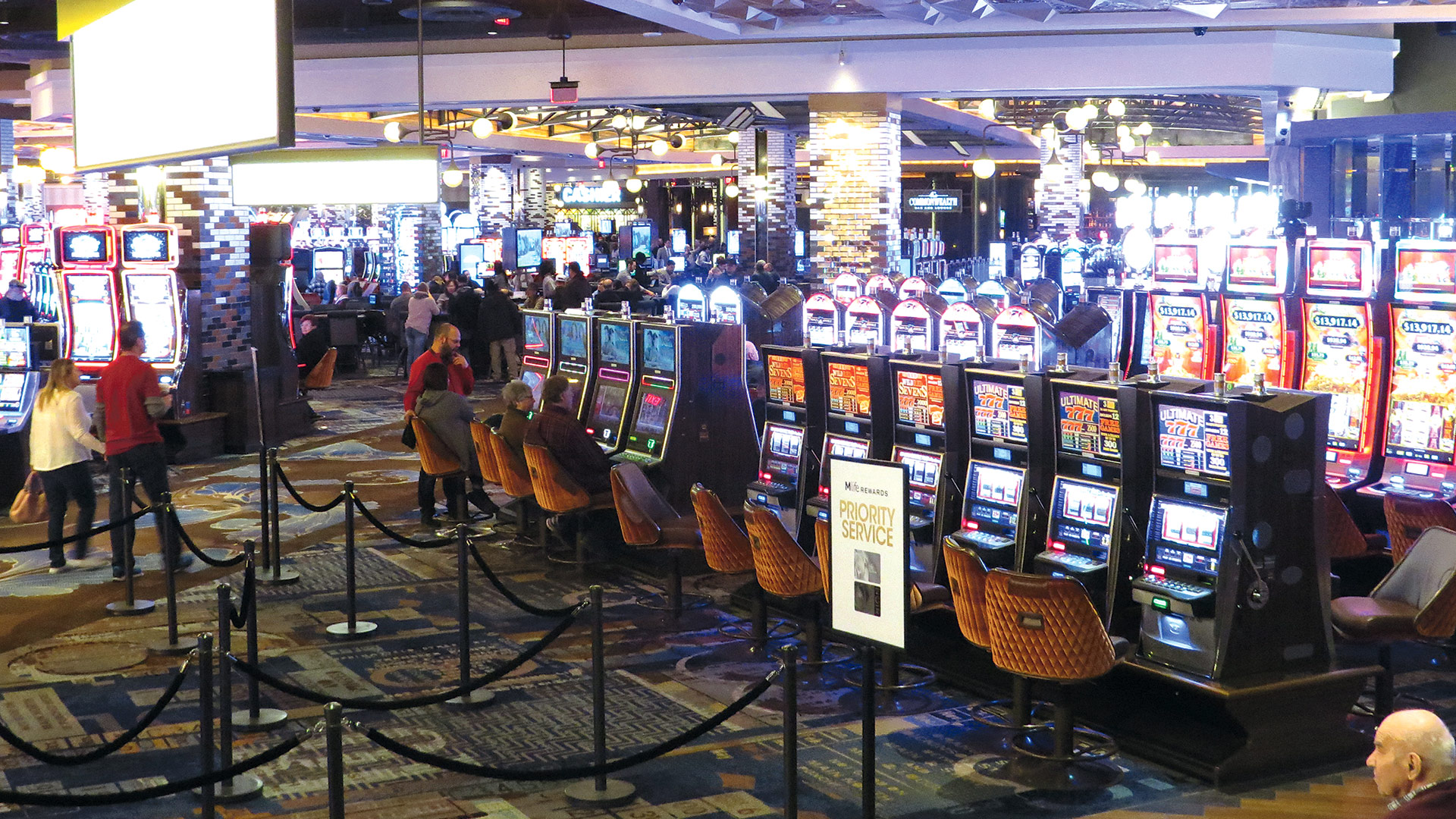
Mike Mathis says the winter months are traditionally the slowest for casinos in the Northeast, and he is optimistic that visitation will climb as the mercury does.
Meanwhile … it’s early, said Mathis, referring to the fact that the casino has only been open for six months, and a few of those months (January, February, and early December, before the holidays) are among the slowest for casinos, especially those in the Northeast.
“I think it’s premature to judge us, or anyone, on a partial data set; it’s a little early to say we’re going to underperform or overperform for our first year,” he told BusinessWest. “If you look at our August and September numbers, we would have exceeded our expectations. And going into the winter months … that’s the low end of the season.”
And, overall, the casino is still ramping.
That means it’s still learning, collecting data, watching patterns develop, and adapting to what the data shows. As he said earlier, it’s an involved process that involves a number of factors, including the weather. Make that especially the weather.
Mathis said he and his team are tuned into the forecasts, because one thing he’s noticed thus far — and this counts as one of the surprises on his list — is that, despite a reputation for being hardy, people in New England are apparently easily scared off from traveling in snow — or even forecasts of same.
“We thought New England would be hardier than what we’ve seen on some of these snow days,” he said with a laugh. “We’ve had a little bit of experience with snow in Detroit and Atlantic City, but I think every market is unique, and we’re learning some of the patterns and behaviors.
“And it’s not just snow,” he went on, sounding much like area golf-course operators when they talk about rain and how it impacts them. “It’s what type of snow and what time of day it hits and what day of the week it hits. Weather forecasts have become an important tool for operating and planning; it’s been a very interesting learning curve.”
One that extends, as he said, well beyond snow, and into other realms such as where people are visiting from, how often they visit, which games they play, which restaurants they frequent, and much more.
Overall, and as might be expected, Mathis is optimistic that the monthly numbers for GGR will improve as the weather gets better and the casino can make much better use of its outdoor facilities with concerts — Aerosmith is coming for the first-anniversary celebration — and other activities.
But looming over MGM Springfield, in a big way, is the opening of a competing casino in Everett, slated for sometime this summer. Mathis said that development will further alter the landscape and certainly add new wrinkles to the ramping process.
Driven by Data
Mathis told BusinessWest that this first six months of operation have been a learning experience on all kinds of levels, and this, too, was to be expected, because gaming is still relatively new to Massachusetts (Plainridge Park Casino, a slots facility, opened in the fall of 2017), and while those at MGM had expectations, they didn’t know exactly what to expect.
What have they learned? For starters, they’ve learned that visitors much prefer the weekend to the weekdays. And while that sounds obvious, the disparity in the numbers is eye-opening.
“I’m surprised at how weekend-centric the business has been — the difference between weekends and weekdays is pretty dramatic,” Mathis noted, adding that, with the former, visitation averages roughly 18,000 to 20,000 a day, while with the latter, it’s closer to 10,000.
This disparity is far greater than it is in Las Vegas and with most other MGM properties, said Mathis, adding that one big reason for this is a still-ramping (there’s that word again) meeting and convention business in Greater Springfield.
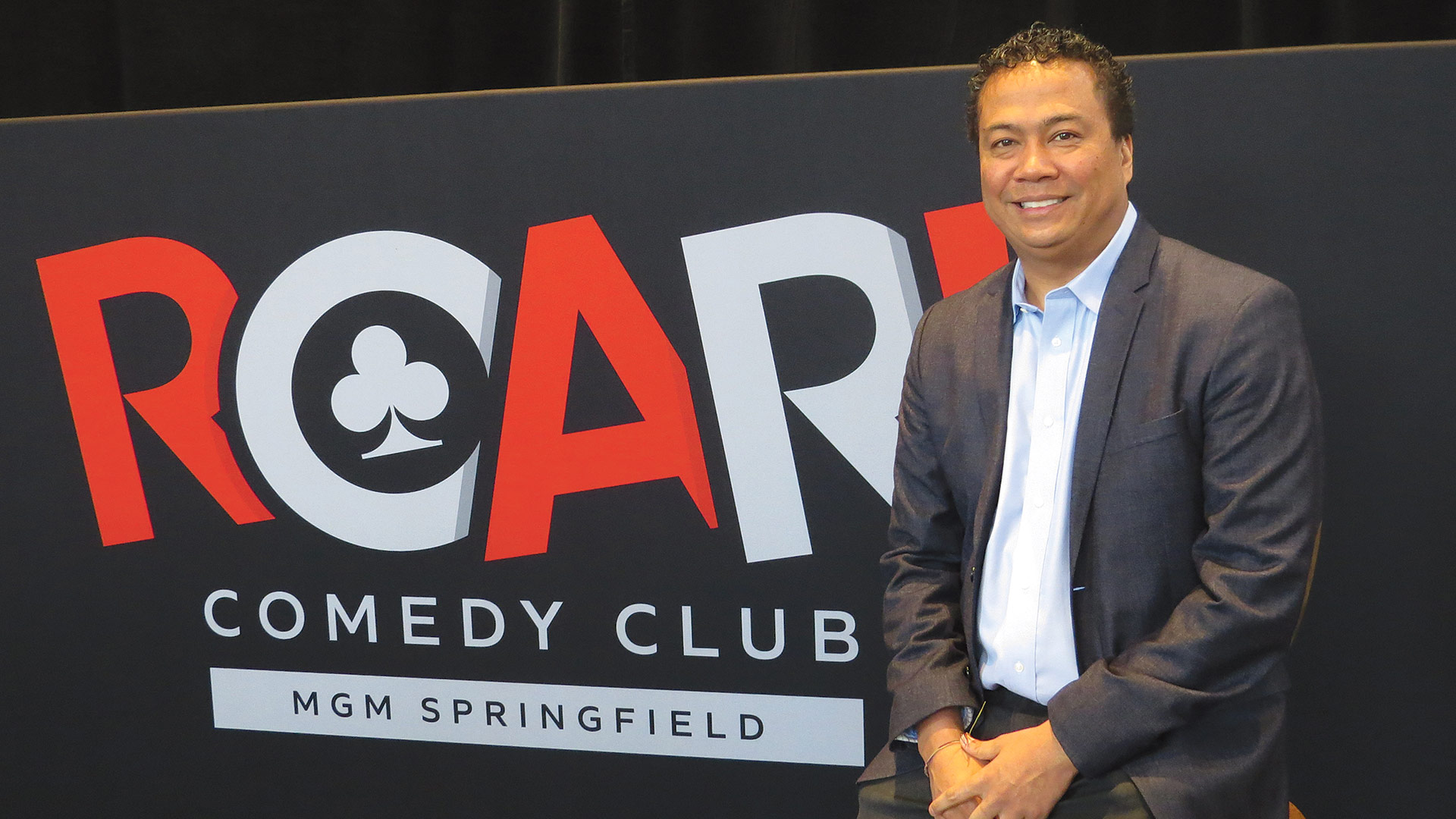
Mike Mathis says the ROAR! Comedy Club has become a solid attraction for MGM Springfield and a vehicle for bringing new audiences to the resort.
“We have the ability to impact those numbers midweek by putting more convention groups in the MassMutual Center, getting more citywide events, and getting more entertainment mid-week, which we plan on ramping up,” he explained. “There’s ways to impact that midweek business to the benefit of the entire downtown.”
What else have they learned? There’s that aversion to traveling in snow that was mentioned earlier. That was in evidence a few weeks back. The weekend before Presidents Day was one of the best the casino had since it opened, said Mathis, crediting MGM’s ROAR! comedy shows and a host of other things happening downtown and elsewhere, including two Thunderbirds games and a camping and RV show at the Big E, for the surge, one that contributed to one of the few real traffic jams recorded since the property opened.
But the holiday itself (a day off for the vast majority of workers in this region) was considerably slower, and Mathis believes that the few inches of snow that fell overnight had a lot to do with this. Of course, Monday is also a weekday.
What else? Well, to date, MGM Springfield is “underperforming” (Mathis’ word) when it comes to attracting people from Central Mass. Indeed, while the casino does well in drawing people from Upstate New York, New Hampshire, Vermont, and Connecticut (the I-91 corridor), the numbers from the central part of the state are less impressive, which, if you take the glass-is-half-full approach, which Mathis does, means there’s considerable room for growth.
“We’re trying to understand the phenomenon of east-west travel on the Pike, frankly,” he explained. “I think there’s a bias to go north-south — I think that might be the more the traditional traffic pattern, and that’s what the data shows — but we’re also doing well with Boston.
“The good news about how this data shakes out is that there’s upside opportunity for us in Central Mass.,” he went on. “And this might blunt the impact of the Everett casino.”
There have been a few other surprises, including the number of people making their first visit six months after the ceremonial ribbon was cut.
“I’m still surprised by how many people I’m meeting on the floor who are seeing it for the first time,” he said. “Our team has been at this since 2012, so sometimes I feel that anybody who was interested in coming would have come in the first month or two. But there are people hitting the floor every day who are brand new, and for whatever reason have decided that this is the weekend they want to check it out.”
A Laughing Matter
While much of the media’s focus has been on GGR and the hard fact that the numbers are not where they were projected to be, Mathis said there are a number of positive developments to note as the casino passes that six-month mile marker. Here are several he listed:
• The data clearly shows that the opening of MGM Springfield has grown the overall gambling market in this broad region, he said, adding that this becomes clear when one does some simple math and looks at MGM’s revenues and the declining numbers for competitors. The former is larger than the aggregate of the latter, which translates into growth, which bodes well for all players.
“I think one of the good things about new properties coming into the market is it keeps everybody in a position of having to keep up.”
“I’ve met countless customers on our floor who have said that MGM Springfield is their first casino gaming experience, and there’s a few reasons for that,” he said. “Some say they were in Las Vegas, they’re Mlife members, and they’d been to a convention or show, but didn’t happen to go into the casino on that trip; with this in their backyard, they thought they’d give it a try. Others will say they like our non-smoking gaming environment and had never gone into another casino because they didn’t want the smoke; that’s a real competitive advantage for us.”
• The ROAR! Comedy Club has been a solid addition to the MGM lineup, helping to drive visitation, especially during some of the slower months on the calendar. Located in the historic Armory, the shows have drawn consistent crowds, said Mathis, adding that, as the calendar turns to spring and then summer, the team at MGM Springfield will look to maximize its outdoor facilities with a full slate of entertainment to be announced in the coming weeks.
“In talking with the comedians, they say we’re now the buzz within that community — it’s a cool venue, something all the comics want to play on their East Coast rotation,” he told BusinessWest. “it’s a great way to expose the building to different customers.”
• The team continues to find new ways to leverage its many facilities at the casino, said Mathis, noting that it has added entertainment in its ballrooms — Sinbad recently performed two sold-out shows — and the staff continually looks for new opportunities.
“We’re doing a lot of fun activations in different parts of the resort,” he explained. “We want to make sure we understand the booking patterns for convention and meeting groups, and when we see holes, it’s like an empty airplane seat; how do you fill it, and how do you bring new customers to the resort?”
• The hotel and food and beverage side of the casino operation has been exceeding expectations, said Mathis, adding that, among other things, a recently added weekend brunch at Cal Mare restaurant has helped grow that side of the equation.
“Our hotel and restaurant business has been extremely strong, and we thought that would be the case, because there’s good, local lodging and F&B in the market, but perhaps not to a Vegas standard, and we believe we’ve brought a Vegas standard to this market. We’ve exceeded occupancy, and we’ve exceeded our average daily rate.”
• But despite this success, there has been some spillover to other area businesses in this sector, and this is by design, said Mathis, noting that the hotel, with 252 rooms, is not particularly large, and the dining options, while growing (groundbreaking on a Wahlburgers is slated for later this year), leave plenty of opportunities for other eateries in the downtown.
“One of the reasons we sized the hotel the way we did was that we wanted to make sure that developments like ours have a spillover effect to other businesses,” he said. “And we wanted to make sure that came true. Some restaurant owners, including the Caputo family at Red Rose, have been quoted as saying that their business is up 20%, and people are expanding and extending hours.”
• Likewise, the numbers regarding the workforce have been generally positive, said Mathis. He estimated a 35% churn rate since the facility opened its doors, and noted that, while this might sound high to business owners and managers in other sectors, it’s in line with industry norms and actually lower than in many other areas.
Meanwhile, the targets for hiring Springfield residents, veterans, women, and minorities have all been met or exceeded, and many employees have already moved up the ladder since the casino opened its doors.
“I got the stat the other day … I think we’ve had 200 or so promotions since day one, and 30% of those are Springfield residents,” he noted. “Nothing makes me prouder than to see a line-level employee on day one who’s now wearing a suit in a supervisory management role. And it’s happening.”
As examples, he cited three employees who joined him for photos later in the day: Bill Blake, formerly graphic supervisor and now creative manager; Nickolaos Panteleakis, formerly Front Services manager (where he handled many front desk duties) and now director of Front Services; and Marissa Dombkowski, who has been promoted twice already — she started as an HR communications specialist, moved up to Entertainment Marketing coordinator, and is now Marketing manager for the MassMutual Center.
Overall, and to recap, Mathis reiterated that ramping up is, indeed, a three-year process, one that involves a serious learning curve on many different levels.
“I tell my team all the time, ‘if it were easy, everyone would do it,’” he said of casino operations in general. “That’s why we’re here — to manage through, collect data, and be smarter every day as we collect data and finetune the business.”
Driving Force
Mathis was one of those people caught in that traffic jam on the Saturday of Presidents Day weekend.
He told BusinessWest that it took him more than 45 minutes to get to an event downtown from his home in Longmeadow, normally a 15-minute drive. But unlike most others, he certainly wasn’t complaining.
“I’ve never been happer to be in stand-still traffic,” he said, adding that, while it has always been MGM’s goal to minimize such disruption, he’ll gladly take more nights like that in the weeks and months to come.
And he predicts he’ll be getting more as that ramping process continues.
George O’Brien can be reached at [email protected]
 We are excited to announce that BusinessWest has launched a new podcast series, BusinessTalk. Each episode will feature in-depth interviews and discussions with local industry leaders, providing thoughtful perspectives on the Western Massachuetts economy and the many business ventures that keep it running during these challenging times.
We are excited to announce that BusinessWest has launched a new podcast series, BusinessTalk. Each episode will feature in-depth interviews and discussions with local industry leaders, providing thoughtful perspectives on the Western Massachuetts economy and the many business ventures that keep it running during these challenging times.











